#i have the books / articles names if anyones interested
Explore tagged Tumblr posts
Text
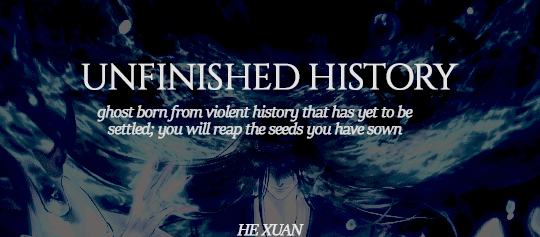

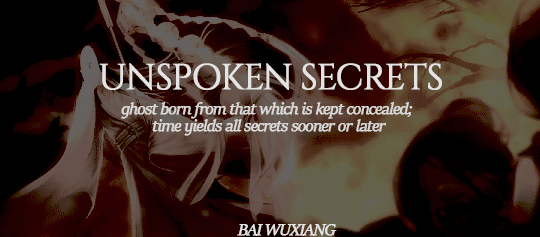
— TYPES OF GHOSTS ( ft. my literature textbooks discussions of types of ghosts in narratives.)
#tgcf#tian guan ci fu#heaven official's blessing#he xuan#qi rong#bai wuxiang#black water submerging boats#Night-Touring Green Lantern#White No-Face#i have the books / articles names if anyones interested#it didn't mean literal ghosts although it DOES apply here#but its fun the different kinds of ghosts there are#and it fit so well#this was actually a project i submitted lmao#there was an essay along with it but shh no one needs that#my edit
169 notes
·
View notes
Text
10 things i hate about you || f.w.
summary: rumor has it that you and fred weasley are going out. being the instigators you two are, you decide to play into said rumors. but just how far could you go before you lose sight of the line between fiction and reality?
words: ~7.9k LMFAO I REALLY WENT OVERBOARD HERE
warnings: cheesiness, cliche 10 things i hate about you vibes, both y/n and fred being oblivious idiots. what’s more to love
a/n: you thought i’d avoid writing another fake dating fic? with fred? NEVER. ik there r some fake dating fred fics out there but i swear we need MORE bc this is the best trope ever idc. also made up a name for the school paper cs i forgot if it was a thing in the books/movies lol. reader is an implied gryffindor/ravenclaw but can technically be in whatever house you’d like : )
add yourself to my hp taglist here!

The problem with Hogwarts was that rumors spread through its halls like fiendfyre.
It all started during the Quidditch match between Gryffindor and Ravenclaw. Harry had narrowly caught the Snitch after a Dementor false alarm and carried the team to victory, causing the stadium to explode into ground-shaking cheers. Waves of deep crimson and gold were pouring onto the field and you almost got trampled in the midst of it until someone pulled you into the center.
“There you are—I was looking all over for you,” Fred beamed. “You were watching, right?”
“I was sitting front row…you literally saw me, Fred,” you stated plainly.
“I know, but I wanted to make sure,” he winked at you, sidelining you into a hug. “You look very pretty, by the way. I think my hat looks better on you than me.”
“Anddd there’s the woman of the hour! He couldn’t stop staring at you—almost crashed into the teachers’ section ‘cause of that,” Lee came over and clasped your shoulder.
“That’s what that was all about? Freddie, you need to get it together!”
“Can’t help when you’re as alluring as a Veela,” the compliment rolled effortlessly off his tongue. He then tilted his chin down to kiss your forehead, and you didn’t bother pushing him away despite the fact that he was all sweaty after being up in the air.
A bright flash of light pulled you out of Fred’s embrace, and you blinked to see Colin standing there with a wide grin on his face, camera in hand.
“Just capturing the moment,” the younger Gryffindor said excitedly. “This is gonna be a good one!”
You thought nothing of it until you went down to the Great Hall for breakfast the following morning. You went over to find your Ravenclaw friends, who seemed to be huddled around something, staring at it intensely.
“Oh, hey Y/N!” Cho beamed brightly at you, moving over to make room for you to sit next to her. “Have you seen the latest school newsletter?”
You filled your plate and took a copy of the Hogwarts Daily Digest that Padma gave you. “No…what’s it all about?”
“Check page 3,” she told you. You took a bite of your toast first, pausing as you scanned over the page. At the front and center was a moving picture of you and Fred embracing, him pressing a kiss to your temple, smiles of pure bliss on both your faces. You had to admit that Colin had a way with pictures; so much so that you almost would’ve believed you and Fred were a true couple just by looking at the article.
“So we’re going out, apparently,” you said, taking another bite of your food, “...Interesting.”
“Several students were interviewed about it, and they’re wondering if you guys are,” Cho explained. “With the way he kept looking over at you during the game, and how he was searching for you after it ended.”
“I—I’ve ought to talk to Fred himself, see what he thinks about this—” you spluttered, feeling hot all of a sudden. “I just—we’re not even—”
“But you would be very cute together,” your best friend added. “I mean, you have known each other for how long now? It wouldn’t come as a surprise to anyone if you were.”

At the end of the day, you went to the library to squeeze in some quiet alone time for reading, curling up on one of the plushy sofas near the bookshelves. You were deep into a mythical book that Hermione recommended, fully zoned in for what felt like forever until the cushion sank a bit, indicating that someone had sat down next to you.
“What do you want, Fred,” you sighed without even looking up from your book. “Come to bother me again?”
He took the book from your hands in response and closed it.
“Hey, I was reading that—” you began.
“I wanted to ask you about the article,” he stated, “don’t you think Creevey’s quite the photographer?”
You scoffed. “If this is about us being a couple, you know we’re not.”
“I was going to suggest something else.”
“And what is that?”
“Given that half the school is talking about us already,” he referred to the whispers in the halls that followed you from class to class, “why not play into the rumors a bit?”
“So you’re suggesting that, what?”
“That we say we’re a couple.”
“...you want to pretend that we’re going out?”
“Why not?”
“That’s insane,” you shot him a glare. “What do either of us get out of it?”
“Practice, of course,” Fred had a proud look on, “but also, why not have some fun with it?”
You stopped and thought about it for a second. He was right—who were you to not want to have a bit of fun? After all, it was just Fred; it couldn’t be that hard to fake-date someone, especially when you had no real feelings for them.
“Fine, but only on one condition.”
“What’s that, love?”
“Promise not to fall in love with me?” You stuck your hand out towards him.
Fred took it and gave it a firm shake, his signature mischievous grin making its appearance. “As long as you don’t fall for me either.”
“Dream on.”
He leans forward, voice dropping to a low whisper. “10 galleons says you’ll fall in love with me first.”
“Oh, please. 20 says you won’t even last half as long.”
“You’re on.”
So it began—settling into the whole routine was surprisingly easy. But of course, it was probably easier since you had money on the line; asides from George, you and Fred were the most competitive people in the entire school. You’d do anything for extra money, glory, and infinite bragging rights.
Making it a point to one-up each other, you began to brainstorm ways to really play up the whole “fake girlfriend” thing.

i. the pda competition, part 1
Monday afternoon’s Potions lesson proceeded as always, with Snape’s annoying, drawling voice instructing you on what to do.
Today’s class was boring but ended early, the only downside being that you were assigned a hefty load of homework.
“By the beginning of Wednesday’s class, you shall turn in to me two feet of parchment on the history of Strengthening Solution and its’ properties…” Snape ordered, “...for now, follow the instructions on the board. Ingredients are in the back. I expect the utmost perfection and accuracy…those who fail shall not be tolerated.”
Groaning internally, you headed to the back of the classroom towards the supply cabinets, Fred following close behind. Either Snape was out to get you both or it was sheer luck that had you paired together for this assignment.
“Wait, you forgot something,” Fred called out as you were about to walk away.
You turned around, a snarky reply ready. “What is—”
You didn’t even have the chance to finish your sentence when he grabbed you by the wrist and tugged you into his chest, kissing you square on the lips. You were completely taken by surprise and had no time to react whatsoever.
Low wolf-whistles and “ooohs” reverbrated throughout the entire classroom as you broke apart.
“What was that for?” you hissed.
There was a devilish grin on his face, and you so desperately wanted to wipe it right off him. “Just trying to be a good fake boyfriend, of course,” he whispered into your ear.
“Touch me again without warning and I’ll break your nose,” you said in a low tone, ignoring the heat rising up your cheeks.
“Miss Y/L/N…Mr. Weasley…” Snape said lowly, “...back to your seats, both of you. This is a classroom, not a bedroom. Get to work.”
Several students giggled at this and you huffed, heading back to your seat. You didn’t speak more than a few sentences to Fred for the remainder of the lesson, face still flushed from the sudden incident. He kept stealing glances at you as you worked in silence, adding the ingredients into your bubbling cauldron with careful, precise movements.
“That’s 1-0 to me,” he reminded you. “Better hurry and catch up, or I’m winning those Galleons.”
“Don’t get ahead of yourself,” you muttered, uncapping the bottle in front of you and pouring some of the liquid in.

ii. the pda competition, part 2
After Fred had kissed you in the middle of a packed classroom, you were determined to get back at him, racking your brain for ideas.
You sat under a sprawling tree by the Great Lake with Cedric, Cho, Padma, Ernie, and several other Hufflepuff and Ravenclaw students. Somehow, you got lucky and all had matching free periods today, taking the opportunity to have a picnic by the water together.
“A little birdie told me that you and a special someone were going out,” Cedric pointed a finger at you, the other arm slung around Cho’s shoulders. “Now what’s going on?”
“They’ve always been mad about each other, only took them a million years to see it,” Ernie butted in. “Isn’t it obvious? One would think they’re already married at this point, though.”
“Who’s married to who?” you heard someone ask from behind you.
“Speak of the devil,” Ernie said, “there he is!”
“Was going to check on you—see you at supper?” Fred lightly touched your cheek. You nodded blindly, the skin of his hand hot on your face.
“Okay, I’ll meet you there.”
You turned back around to see everyone smirking at you knowingly.
“What?” you questioned, adjusting the collar of your shirt as if nothing had happened.
“Aren’t you two the cutest,” Cho laughed breathily, “Ernie was right. It’s like you’re married.”
“Oh shut up, we’re still much too young for that.”
“Not for long!”
Of course the only empty seat at the Gryffindor table that evening was next to Fred, and he made sure that you were sitting as close to him as humanly possible. All it would take was an extra few inches and you’d fully be sitting on his lap. You shook off the embarrassment and snapped back into it, determined to win the bet.
“I missed you all day, you know,” he admitted, placing a dinner roll onto your plate for you. “Where have you been?”
“By the lakes,” you said matter-of-factly. “Where else would I be?”
“With me, obviously.”
“I’d rather be anywhere else.”
“Well that hurt,” he pretended to look hurt. “I thought I was your favorite.”
“Second to last,” you joked. “Hey, wait—there’s something on your mouth.”
“Where?” he tried motioning around with his fingers but to no avail.
“Right…here…” you murmured, gently grasping his chin and pressing a lingering kiss to the corner of his lip, tasting a hint of the sweet cranberry sauce he’d been eating on the tip of your tongue. Loud gasps erupted through the Great Hall at the sudden private but public display.
Fred inhaled sharply—he knew you were bold, but like this? For once, the jokester had nothing sarcastic to counter you with and was at a loss for words.
When you pulled away, both yours and his faces were a shade of deep scarlet.
“Cat got your tongue?” you smirked, discreetly slipping a sheet of paper into his back pocket. “That’s 1-1 now, Fred.”
Again, Fred was left speechless.
“I feel like I’m interrupting something very…” Ron coughed, damn near choking on his chicken leg. “Intimate. Scandalous. Very—”
“Shut it, Ronald,” you cut him off. “Can’t a girl snog her boyfriend when she wants?”
More jaws dropped at your reply, and you simply continued eating, a victorious grin on your face. Fred looked down and fished the note out of his pocket, unfolding the smooth parchment to reveal your tidy penmanship.
Now who’s the flustered one? you know where to find me if you need me xx
You were so going to win.

iii. the serenade
You found yourself sitting on the bench watching the Gryffindor Quidditch team practice—it was Fred’s idea to show up to as many of them as possible to really sell the whole “fake dating” thing. You didn’t mind all that much, as you got bored easily and liked to have a change of scenery every so often while you were studying.
A loud, abrupt screech caused you to look up from your textbook and you winced, covering your ears.
“You’re just too good to be true…can’t take my eyes off of you…” a melodic voice began flowing across the stadium. Confused, you set your book down and stood up, looking around for the source of the noise.
“You’d be like Heaven to touch, I wanna hold you so much…at long last love has arrived…”
Fred suddenly appeared from the commentator’s box, holding a microphone. He casually leaned against the pole before sliding down and hitting the bleachers, gracefully making his way down the steps.
“...And I thank God I’m alive…” his eyes remained focused on you, blazing gold and green. “You’re just too good to be true…”
“What the—”
He spun around and pointed at you, the corners of his lips quirking up in a childish grin, “...Can’t take my eyes off of you.”
“HIT IT, WOOD!” you heard someone (was that Lee?) yell, and music began blasting from the speakers.
Your friends were eyeing you with delight, fully entertained by the fact that you had absolutely no clue what was happening. Fred continued singing while he sauntered down the bleachers with a grace that you had never seen.
“I love you, baby, and if it's quite alright
I need you, baby, to warm the lonely night
I love you, baby, trust in me when I say
Oh, pretty baby, don't bring me down, I pray
Oh, pretty baby, now that I found you, stay
And let me love you, baby, let me love you”
A blush coated your cheeks as he finally approached you, taking one of your hands in his and twirling you around. He held your gaze the entire time, eyes alight with what looked like genuine joy and passion. The rest of your classmates joined in as they crowded around you, joining together in one voice.
It was impossible to hold back the smile creeping up your face as Fred continued to sing—he was undeniably charming, and you had to admit, this was well worth suffering a brief loss for.
“Oh pretty baby, trust in me when I say…” the final lyrics left his mouth and everyone burst into applause. He made a show of bowing dramatically and kissing your hand in an exaggerated motion.
You rolled your eyes at the overly extravagant gesture. But deep down, you had enjoyed every second of the impromptu serenade.
Within minutes after it ended, Fred’s musical spectacle was the talk of the school. Students nudged each other in the corridors as you passed by, whispering words of encouragement, saying how they wished for a relationship like yours, and wondering where they could possibly find someone like Fred.
You felt him slip something into your robe’s pocket. Fred had sidled up next to you as you headed up the stairs to the common room, still grinning widely.
“2-1,” he reminded you, kissing your cheek before turning to the Fat Lady and uttering the password. He stepped through the portrait hole and turned back to wait for you, then walked all the way inside. “Better continue that game of catch up, I might just steal the title of ‘best fake partner ever’ from you.”
There’s that beautiful smile, the note read. Keep it on for me, will you?

iv. the nightmare
Your body seemed to have a mind of its own, because it was 3:27 a.m. and you were wide awake after barely squeezing in a few hours of sleep.
Nothing you did worked; even the Potion for Dreamless Sleep had failed to keep the nightmares at bay. You didn’t last long before jolting awake, beads of sweat forming at your forehead and chest heaving with raggedy, jagged breaths.
After several minutes of tossing and turning you gave up, quietly tiptoeing down the stairs to the common room. The fireplace was on, indicating that someone was already there—
“Y/N?” Fred turned around from his spot on the couch to look at you. “What’re you doing up at this hour?”
You yawned, “I could ask you the same thing.”
“Finishing an assignment,” he sighed, rubbing his forehead. Sheets of parchment, a vial of ink, and several books were spread out on the coffee table. “You?”
“Nothing,” you lied, sitting down next to him. “Couldn’t sleep.”
He didn’t miss the hoarse tone in your voice nor your tear-stained face, stopping what he was doing to fully focus on you. “Now I know that’s not true. What’s bothering you, really?”
“I said I’m fine, just can’t sleep.” You let out a shuddering sigh and attempted to will the tears away, but your vision began to blur. “Go finish your work—”
“Hey.” Fred’s voice was soft. “Come here.”
His arms gingerly wrapped around your trembling frame to envelop you into a tight hug. He reached one hand up to smooth out your hair as you shook with silent sobs, your hands curling into the fabric of his robes as if holding onto him would keep you from slipping away and losing yourself again.
Fred was never one to be patient, but he knew that you just needed this moment free of chaos. So he waited, laying there with you as he continued murmuring soothing words into your ear, gently rubbing your back; he’d wait for as long as he’d need to.
You didn’t know how much time passed until the tears ran themselves dry and your throat felt like it had been scraped raw.
“Want to tell me what happened?” he suggested. “But only if you’re comfortable, that is.”
You hesitated, wondering if it was a good idea to tell him. Maybe he’d think you were strange…but seeing how he looked so genuine in that moment changed your mind.
“I lost you…I lost everyone. I watched you die, Fred.” Your voice was cracked and raw, which sent a pang through his chest. The image of Fred’s lifeless body trapped between the rubble flashed across your vision, feeling as if it was wrapping its cold fingers around your throat. “I watched you all die and I couldn’t save you.”
“But I’m alive and well right now, aren’t I?” he assured you calmly, “I’ll be here for as long as you want me around. You’ll have to fight to the death to get rid of me.”
Managing a broken laugh, you looked up at him. “Really?”
“Really. What are fake boyfriends for, anyway?” His hand found its place against your cheek, fingers gently skimming across your skin. You leaned into his touch and let out a sigh, lips just barely brushing over his palm.
“No one’s here, Fred…you don’t need to pretend.”
“I know I don’t.” Any and all traces of half-witted sarcasm were gone; wiped clean off his face. Instead, his eyes were glossed over with concern as they raked over yours. “Figured I could keep you company? Since I didn’t want you to be alone in your head like this.”
“I’d like that.”
He then passed a familiar folded square to you, and you opened it with a smile.
I’m here, whenever you need - F.W

v. the hospital wing run-in
“For Godric’s sake, how many more times will I have to see you in here?” Madam Pomfrey demanded as she hurried around, setting a metal tray by your bedside. “This is the third time this month.”
“Sorry,” you winced as you shifted your injured leg onto the pillow she’d set out.
“What is it this time?”
“I broke my ankle.”
“Doing what, exactly?”
Pursing your lips, you elected to tell her the modified version of the story, which was the one where you had tripped while going down the stairs, not the one that included running down the Astronomy Tower after sneaking up there for a dare (the twins’ doing).
She shook her head in disbelief, glancing over the cuts on your face and fixing the bandages around your foot. “You’ll be in here for a few days. We’ll have to regrow the bones in your foot and ankle…my, how someone can break this many bones just from missing a step, I can’t seem to understand…what are all of you doing here?”
You followed her gaze to where Hermione, Ginny, Cho, and Fred were standing by the hospital wing’s entrance, alight with excitement upon seeing that you were awake.
“Guys—”
“Miss Granger, Miss Weasley, and Mr. Weasley, need I remind you that no visitors are allowed at this time! I advise that you all head back,” Madam Pomfrey ordered sharply.
“But we haven’t seen her all last night and this morning! Can we just stay for a minute,” Hermione begged. “Please?”
The older woman sighed as she scanned your friends (and fake? boyfriend’s) desperate, pleading faces. “...Alright, then. Don’t stay too long and for Godric’s sake, let her breathe.”
They immediately crowded around your bed and Fred walked over to your side, crouching down so that you were eye level with him.
“There’s my princess,” his charming persona was back in full force, and he smoothly brushed a few stray hairs out of your face. For what felt like the eleventh time, he was swooping in to kiss your cheek. Not that you were counting. “How’re you feeling?”
“Better now that you’re here,” you winked as you attempted to prop yourself into an upright position, but failed, giving up and flopping back down. “Ow. My foot.”
Ginny pretended to throw up on Hermione, who then elbowed her in the stomach. “Ow!” she yelped. “What was that for?”
“Let’s leave the happy couple alone,” she hissed, and they slowly backed away to give you some space.
Fred pulled up a chair next to your bedside, propping his chin in his hand to stare at you. “I’m sorry, really. I didn’t mean for you to end up with five broken bones.”
“And a concussion, a killer headache, and not to mention dozens of sore muscles,” you grimaced, but felt a slight ache in your chest when you realized he looked genuinely guilty. “I don’t blame you, really. I mean, I was just as stupid and reckless. I definitely could’ve been more careful but I wasn’t.”
“I’m supposed to mess up your lipstick,” he groaned, “not your bones.”
“Someone took ‘public displays of affection’ the wrong way,” you said sarcastically, and then there was a brief moment of silence before you both burst into laughter.
“Damn right he di—OW, Hermione!”
“Gin, let’s go!” With that, the two girls left the hospital wing, leaving the two of you alone.
“Why are you here, anyway? Hermione and Ginny are because they’re my friends, and you’re my—”
“—lovely, charming, undeniably handsome boyfriend, of course. Why wouldn’t I be here?” Fred finished your sentence for you.
“Right,” your voice was dripping with sarcasm, “I just can’t seem to get rid of you, can I? It seems like you’re always around.”
“And yet, you don’t push me away,” a smile tugged at his lips. “Which clearly means that I’m just that irresistible. I don’t need a charm or some silly love potion to reel you in.”
“Don’t think that because I’m incapacitated, this game is over,” you warned him. “I will beat your arse to a pulp, and you’ll be twenty Galleons lighter. I bet you’re madly in love with me already.”
“Believe what you want, my darling,” he sing-songed, twirling his wand between his fingers. “But we all know I’ve already won this game.”
“Yeah, right. We’re tied now, by the way. That’s for getting me injured.”
“Oi! You can’t just—”
“Shh…don’t come crying to me ‘till you lose.”
He ended up staying overnight.
You didn’t protest at all.
Neither did Madam Pomfrey later that evening after seeing him slumped over on your bed, fast asleep, one hand clutching yours like you were the only thing he had left to lose.

vi. the howler
For once you managed to get to the Great Hall before Fred did. The bloke was always criminally late or ridiculously early to everything; it was almost laughable how there was no in between for him.
He finally showed up just ten minutes before breakfast was supposed to end, breathing hard with his hair all messed up.
“What’d I miss?” he asked you.
“Nothing,” you responded. “Just another ordinary day…”
A gust of wind suddenly swept through the hallway causing the napkins to flutter in the air. A giant grey owl came swooping down onto the table and landed straight in front of Fred, clutching an envelope in its curved talons.
“What’s Errol doing here? We’re not supposed to get our daily mail til’ tomorrow,” Ron gawked, “surprised that he’s here given the number of times he’s collapsed mid-delivery—oh blimey Fred, you must be in trouble! You’ve got a Howler!”
Several Gryffindors around you giggled at this.
With a slight look of confusion and fear, Fred carefully removed the seal on the bright red envelope. Molly Weasley’s booming voice immediately came bursting from the pages.
“FRED WEASLEY, HOW COULD YOU NOT TELL ME THAT YOU WERE DATING MY FUTURE DAUGHTER-IN-LAW! I AM DISAPPOINTED IN YOU—Y/N dear, if you’re hearing this, I’m very happy for you and hope to see you at the Burrow soon, I’ll make sure to whip up some homemade custard for you—YOU OUGHT TO TREAT HER RIGHT, BOY, OR ELSE! I BROUGHT YOU INTO THIS WORLD AND I SURE AS MERLIN CAN TAKE YOU RIGHT OUT!”
A silence fell over the entire Great Hall and Fred sat there, in shock. The red envelope folded itself up and then burst into flames, its ashes crumbling to the floor.
“I’ve never seen him turn that red,” George sniggered. “You’re bloody brilliant, Y/N.”
“Y-you did this?” Fred spluttered.
“Can’t say I didn’t,” you hummed, patting his head affectionately. “Your mum was bound to find out, one way or another.”
“And you thought this was the best idea?”
“Aww, is little Freddie all embarrassed?” you teased. “Never thought I’d live to see that day.”
“Quit gloating,” the redhead grumbled. “You haven’t won yet. Better sleep with one eye open tonight.”

vii. the pda competition, part ∞
As it turned out, continuing to slip into your fake relationship only became more fun as the days and weeks dragged on. And being competitive only added to the fun, as you were scrambling to one-up each other.
You often opted to hold his hand when walking from place to place, which wasn’t difficult given that you were almost always with him now and had to sell the idea that you really were together. His hands were rough and calloused from all those hours working on joke shop prototypes, but they were still surprisingly comforting. A way to keep you grounded when your head got stuck in the clouds.
Fred’s signature move was, of course, dropping random kisses on your cheek when you didn’t expect it. Sometimes, when he was feeling bolder than usual, that would change to the tender spot between your ear and jaw, your shoulder, or your nose. And each of those times he made sure they were extra drawn-out and that you were in a crowded area so others would see it. The courtyard. The Quidditch pitch. The classroom (two of those incidents were in Potions, much to Snape’s dismay. He didn’t even bother taking points off due to being too disgusted).
“I have a massive exam today,” he declared loudly to you as you stood in front of his upcoming class together. “I think I’m going to need a kiss.”
“Why?” you scoffed. “What do you need that for?”
“For good luck,” Fred said, “it’s kind of a tradition, isn’t it?”
“You…want a kiss for good luck?” you started.
“I’m waiting…” he sang, face turned slightly in an invitation. You sighed and went up on your tiptoes, doing as he asked. “Thank you. But you have terrible aim…you missed.”
“I fear you’re having way too much fun with this,” you muttered. “Don’t make excuses. My lips are not going near yours unless they absolutely need to now.”
“Oh come on, you know you’re having loads of fun too,” he called out as he walked into the classroom. “Catch you later, sweetheart!”

viii. the butterbeer (alt: the pda competition, part ∞)
It was the day of another Hogsmeade outing and you were hand-in-hand with Fred as you walked down the cobblestone streets together. You had planned to spend the day alone for the most part and join Cho for a meal, but Fred had cornered you at breakfast and insisted you go on a date with him.
“To keep up the façade,” he insisted. “Wouldn’t people find it odd if the castle’s favorite couple wasn’t together?”
You nodded and didn’t protest further; you had no energy to do so anyway. It was far too cold for your taste; you had been dragged out without having time to grab your gloves, blowing hot hair into your hands that were steadily growing numb.
“Love,” he called for you as he took your hands in his, “oh, your fingers feel like ice.”
“No…shit…” your teeth chattered as you attempted to respond steadily. “Might lose ‘em if we don’t hurry up and get inside—”
“Wait one second,” Fred said as you two stopped right outside the Three Broomsticks, wasting no more time in taking his gloves off and handing them to you to put on, while he wrapped his house scarf around your neck. “There. Let’s head in.”
“But—”
“Boyfriend duties, remember?” he winked at you as he pushed the door open, holding it for you to step inside first. “Come on. I think a butterbeer or two’ll warm you up.”
Fred’s hand remained on the small of your back, pressing in gently to lead you to a cozy booth in the back. The added warmth felt quite nice, you thought, but you also wondered how he managed to stay like a human furnace when it the weather outside was so dreadfully cold.
It was hard not to stare at him; catching his gaze every so often while sipping your drink. His hair was all tousled from the frigid winds; you took notice of the way it slightly curled out at the ends, glowing under the hazy yellow bar lights. It was annoyingly endearing how he could look so flawless without any effort and even more so that you didn’t have anything snarky to say.
“Fred, I think we’re being followed…” you whispered as you scanned the near vicinity, fingers brushing against the rim of your mug. There in the far opposite corner sat Padma, Ernie, Cedric, and Cho, attempting to look nonchalant as if they weren’t half-stalking you but they were doing a rather terrible job at it. You quickly looked away.
“So? Isn’t that what we want—for people to see us?” he countered with a tone of confidence. His voice dropped low as he continued to speak to you. “Why don’t we give them a show? No need to be so private.”
Your face burned. “What do you—”
“Not like that,” he chuckled lowly, “what did you think I meant?”
“I…”
Fred paused, then raised his hand and brushed something off your cheek with his thumb. “You’ve got something on your face.”
“Oh, so we’re playing that game now, are we?”
“Indeed, my lady.”
You scoffed quietly and imitated his motion, reaching up to smooth out the crease that had formed between his brows. “Put a smile on your face, why don’t you? You look better that way.”
“I always look good, though.”
“I look better than your greasy arse.”
“Oh, shut up.”
“Oh yeah?” you challenged. “I’d like to see you tr—”
Before you could say anything else and before he could stop himself from what he was doing, Fred placed a hand on the nape of you neck and pulled you in, kissing you without another word. All protests left behind flew right out the window (along with your morals, too, you thought) and for a split second, it almost didn’t feel like you were pretending at all.
When you broke apart eventually, breaths a little heavy, neither of you needed to look over to see that your friends were gaping in shock, mouths dropped wide open. Sure, Fred was confident and cocky and you were equally so, but both of you would be lying if you said this didn’t take you by surprise.
“You still keeping track?” His voice still had that low, almost husky tone to it. He was cupping your cheek now, and you let him keep doing so. “There can only be one victor, right?”
“Wouldn’t forget it,” you exhaled. “You think we look convincing enough right now?”
“Without a shadow of a doubt.”

ix. the thunderstorm
The day’s exciting Care of Magical Creatures lesson was cut thirty minutes short due to the heavy downpour that had suddenly came crashing down, bringing with it a booming thunderstorm and soaking all your clothes within minutes.
“Well, that’s it fer today, everyone,” Hagrid announced, “now let’s head back inside, don’ want yeh to catch a cold, we’ll continue when the weather lets up…”
You wrapped your cloak tighter around yourself and flipped the hood on over your head, eyes narrowing as you stared up at the suddenly stormy grey sky. It just had to be on the one day you got to go outside and do something exciting, damn it….
It was freezing, nearly as horrible as that one day in Hogsmeade, and you wanted nothing more in that moment than to simply curl up by the fireplace with Hermione, the Patil twins, and Cho, and talk all evening long. If you could even make it back to the castle in one, unfrozen piece, maybe you’d at least get your hands on some hot chocolate from the kitchens…
A warm hand found yours amidst the strong winds, and all of a sudden you didn’t feel so cold anymore.
As if he had read your mind, Fred said, “how about we sneak into the kitchens and grab something to drink? Hot chocolate, perhaps?”
“Sounds perfect,” you smiled and he draped an arm over your shoulders, bringing you into his side. It felt so natural now, like this wasn’t part of some long-standing bet to fool the whole school; as if you were just two best friends trying to keep warm in subpar temperatures. And it was almost too easy to get used to it.
“Oblivious idiots. I told them for years that they’d be perfect together and it’s only this year that they start going out,” George exclaimed from several yards behind, walking side-by-side with Lee Jordan. “Dunno why it took them so long.”
“Love takes time, obviously,” said Lee as he watched Fred lean into your ear and say something, and you giggled lightly in response, “and now, what matters is that I finally have an excuse to make fun of them during Quidditch matches.”
“Oh—good point.”
“And you’ve noticed that he stopped pranking her? Unlike him, isn’t it?”
“Wait…” George paused as he took in Lee’s questions. His mouth formed an ‘o’ in realization. “He’s utterly whipped, that git.”
“What happens when boyfriend duties overcome prankster duties…this is perfect. Professor Flitwick owes me 2 galleons. I called it that he’d fall first!”
“You bet on them?” George squawked. “With Flitwick?”
“Don’t tell me you didn’t either,” Lee laughed, “I know you did too.”
The expression on George’s face shifted into one of defeat. “I lost,” he muttered, “I owe McGonagall 3 galleons.”

x. verum exeat (let the truth come out)
The Gryffindor common room was alight with chatter once again. After a long, grueling week of exam revisions, Quidditch practice, and a brutal match to be remembered, Lee and the twins decided that a small celebration was in order. They had originally planned on inviting half the damn school but after arguing with Hermione, had to shrink the party down to just their smaller, usual friend group (they swore up and down that they’d clean up and not get detention like last time, but she wouldn’t buy it).
But you knew that if things had the Weasley twins’ names pasted next to them, they’d be far from peaceful; as far as you could possibly get—no matter how big or small.
“Oh, there you are,” you heard someone say from behind, and turned around to see that it was Hermione.
“Not drinking?”
“Someone’s got to take care of the boys after they go wild, right?” she explained. “Besides…I can’t stand the taste of firewhisky. It burns.”
You offered a tired half-smile and agreed. “Yeah. You’re right.”
Hermione seemed to be deep in thought for a moment until she told you, “You’re very lucky, you know.”
“What are you talking about?”
“To have Fred, that is. To find someone who’s that in love with you, it’s quite rare.”
“Oh, please,” you tried to suppress a laugh, “I told you why we’re doing what we’re doing.”
“And?” Hermione raised an eyebrow at you, ���feelings change. Bet or no bet, he cares about you and anyone would be crazy not to see that. Ronald is half-blind and he can tell, too. You can’t possibly tell me that everything you’ve done up to this point has been a lie.”
“It’s meant nothing to me,” you said bitterly. “I hate him.”
“You don’t mean that.”
“I do. And it doesn’t help that he’s everywhere,” you stopped to take a swig of firewhisky, “and I can’t stand it!”
“Do you not, really?”
“I do, but I—”
“You what?”
“I just hate him!”
“What do you mean?”
“What do you think? I hate everything about him!” you exclaimed, exasperated. “I hate the way he always tries to compete with me, I hate the way he doesn’t take things seriously, I hate that stupid, annoying little smirk he has on his face half the time I see him—”
You inhaled quickly; it felt like you’d just drank an entire vital of Veritaserum with the way that words were tumbling out of your mouth. Hermione gave you a look that seemed to say ‘Go on,’ so you did, “—I hate the way he walks down to the Great Hall every morning with his annoyingly perfect messy hair, I hate the way he risks freezing his arse off to give me his favorite gloves so that I don’t get hypothermia, I hate the way it’s so easy for him to kiss—borderline snog me like it’s nothing, I hate how this is all just supposed to be a game of pretend, and—and most of all, I hate the way he made me fall in love with him without even trying. I hate the way I don't actually hate him. Not even close, not even a little bit…not even at all…”
“You…really mean that?”
You whirled around to see that Fred was standing right behind you with his hands behind his back, eyes hopeful, and you felt your heart drop down to your stomach. “Fred—”
“Y/N, I—”
Suddenly it seemed like the walls were closing in on you from all sides, the room spinning; and then, everything around you jumbled into one chaotic mess of noise and color. Without looking to see either his or Hermione’s reactions, without caring that half the room had stopped to see what was going on, you pushed past your friends and quickly clambered out of the portrait hole.
“What was that about?” Ron’s nose crinkled in confusion. “So much for being a cute couple. Now this is just sad.”
“Will you shut it, Ronald,” Hermione whacked him on the shoulder.
“OW—”
“Stop being so dramatic! Don’t let me catch you drinking even one more shot or I will drag your arse back to bed,” she snapped.
“Pleeeease do, I would lov—ow, ow, OW! OKAY!” Ron exclaimed as she pinched his ear and began dragging him away. “Okay! I’ll leave them alone, I’ll stop…”
Chest heaving and vision blurring with tears, you rushed outside, desperate for a breath of fresh air. It was quiet in the courtyard asides from the faint trickling of water but that did little to calm you down; it was still too loud, too chaotic, too much. Sitting down at the marbled edge of one of the fountains, you tried to catch your breath and balance, but the world still kept spinning…it felt like it wouldn’t stop spinning; for Merlin’s sake. All you wanted to do was crawl into a hole and disappear forever, or jump off the Astronomy tower and fly off to a distant land. You didn’t want to have to worry about how you poured your entire damn heart out in the middle of the common room about your fake boyfriend.
Your fake boyfriend that you realized, with horror, you had begun to develop not-fake feelings for.
A chill ran through you at that moment and you shivered.
Then the feeling of something warm—a thick coat—being draped over your shoulders shook you out of your trance. You instinctively slid it tighter around yourself.
“Thought I might find you out here,” said Fred. You opened your mouth, ready to ask how in Godric’s name he knew where you were at all times when he didn’t even have the Maurader’s Map anymore, but stopped. This was Fred Weasley, and you had spent an unhealthy amount of time around each other over the past several months that he had to have picked up on your little habits. He was more observant than he let on.
“What are you doing out here?” You couldn’t bring yourself to look up at him.
“I couldn’t leave you alone outside to freeze, could I?” he asked, sitting down next to you. “What kind of boyfriend would that make me?”
“Please, just…” you inhaled sharply, “I can’t do this. You won. I lost. The game’s over, Weasley.”
“On a last-name basis now, are we? Ouch,” he said jokingly, but dropped the teasing lilt in his voice when he noticed your eyes starting to water. “Talk to me, Y/N.”
“It just isn’t fair,” you whispered, looking down at your feet.
“What do you mean?”
“It’s not fair,’” your voice faltered, “you’re not supposed to do that. To do this.”
“Do what?”
“To sabotage the bet. To make me lose track of the scores.”
“Well, I stopped counting, you know,” Fred admitted, tucking a hair behind your hair. “There’s no need to keep track anymore, I think we’ve done enough convincing, don’t you think?”
“But that’s the problem!” your voice cracked as you finally turned to look at him. “It isn’t that I’m probably going to be dozens of Galleons poorer after this. It’s that I’m feeling something I shouldn’t, that…that you made me fall in love with you—”
“Y/N—”
“—I hate the way I care about you far more than I should,” you continued on, “and I hate myself even more for even wishing what we had was real. Because it was all fake, Fred, and you know it. We were faking it, and—”
“Y/N,” he repeated more sternly this time, causing you to stop mid sentence. “Look, I already told you I stopped keeping track. After that night in the common room….that’s when I realized I couldn’t. Lee damn near had to hit me over the head and force-feed me Veritaserum to admit that I was in deep. Galleons and glory be damned, I didn’t care about any of that anymore; it was easy for me to pretend when I was already in love with you.”
“But we weren’t supposed to fall in love, that was the rule,” you sniffed, wiping a tear from your cheek, “I thought we were supposed to follow the rules.”
Fred’s lips twitched into a smirk. “Well, I think some rules are made to be broken.”
And then, he was closing the gap and connecting your lips in a deep kiss. The gentle motion cut through the chilly evening air, washing over you in a blazing heat that had you melting into a haze of firewhisky, adrenaline, and something that smelled distinctly like a crackling log fire and cinnamon.
You had kissed him multiple times before this, but this one felt different than all the rest. It didn’t feel like you were doing it for show in the slightest; it felt genuine and warm and so real.
And the biggest difference was that you never wanted it to come to an end.
“So?” The grin on his face was palpable; contagious, as you broke apart, “What do you say, we stop faking it?”
“Are you fake breaking up with me?” you gasped and pretended to look surprised. “Way to ruin the moment.”
“I’m asking to real-date you, darling,” he said.
“There’s no money on the line this time?”
“No,” he hummed as he leaned forward to kiss you a second time and pretended to think for a second, “but there might be something else on the line instead.”
“And what is that ‘something else?’”
“You’ll have to wait a few years and see.”

xi. the promise
—FOUR YEARS LATER—
Fred was a great planner, of course. “Brilliant,” Harry would say, “absolutely brilliant.” He might’ve been a jokester, but he was a very organized jokester. He always knew what he was going to do and when.
So when it came to you, he thought he had a plan. He thought he had it planned for years; he was thinking fireworks, extravagant displays in the sky, taking you on a sunset ride across Romania on one of Charlie’s dragons. Something to match your free and daring spirit.
But, the moment ended up presenting itself on its own.
It was an ordinary night with yours and Hermione’s families joining the Weasleys for a quiet weekend at the Burrow. Mr. Weasley was listening intently as Mr. Granger and Harry explained the function of rubber ducks and the Internet in great detail, and the rest of you chatted with your parents, Mrs. Weasley, and Mrs. Granger by the kitchen counter about post-graduation plans.
Mrs. Granger had made an off-hand, passing comment about how lovely your silver bracelet—the one with charms of yours’ and Fred’s initials and Patronuses dangling from it—looked on your wrist. And then Fred was saying, “I know something else that would look great on her,” and taking a small box out of his pocket and flipping it open, revealing a blinding bright, silvery diamond ring.
Even as shouts of realization and cheers of joy rose up from around the kitchen, the world seemed to fade away into complete silence when he put the ring on your finger and encircled his arms around your torso, kissing your cheek and whispering into your ear,
“I told you there was something else, didn’t I?”

tags: @xhanthexzoria @arkofblake @fictionalsimp449 @polar-myst @katelikeslaughs @lmllsl @schlattandcompany
#fred weasley#fred weasley x reader#fred weasley x y/n#fred weasley x you#fred weasley imagine#fred weasley fluff#harry potter fanfiction#harry potter#hp fanfic#hp imagine#fred weasley fic#hogwarts
1K notes
·
View notes
Text
The Plurality of... Bill Cipher (The Book of Bill)
Spoiler Warning for Gravity Falls, The Book of Bill, and the nature of reality as you know it
Hello dear reader.
I recently found in my possession a strange book with no explanation as to how it got there. A bizarre tome known only as The Book of Bill.
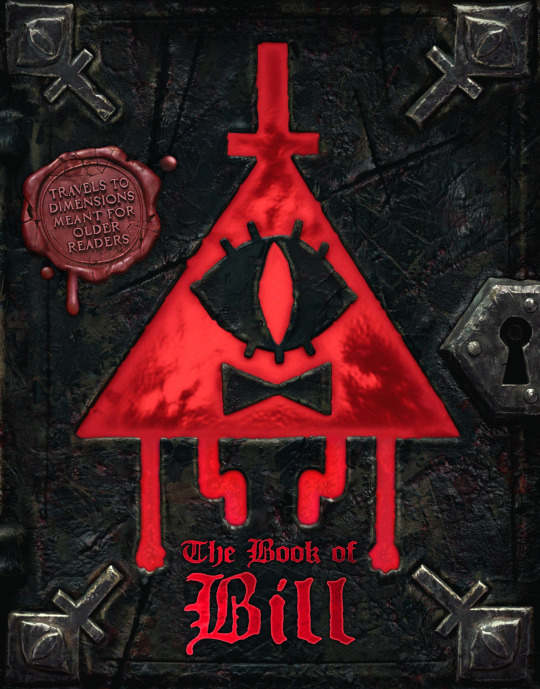
I recognized the name and imagery from someone else's memories. Bill Cipher, a character from Alex Hirsch's hit series Gravity Falls.
It honestly seemed too perfect. I've been doing this "Plurality of..." series where I look at plurality in media. And an important part of Bill's shtick was possession.
It seemed simple enough. I can read the book, learn a bit about Bill and his possession, and then write an article about his plurality. But the reality was anything by simple, with far more than I bargained for.
And by the end of this post, this book will have driven me to break a fundamental rule I've held sacred through my "Plurality Of..." series.
What is Plurality?
Before we begin, I should explain what plurality is for anyone new here. Plurality is a term for being multiple in one body in some way.
We call the body's occupants "headmates". These can be anything from alters in dissociative disorders to spirit guides bound to a mortal, to... yes... even literal demonic possession.
Yeah, even being possessed by a demonic triangle from a 2-dimensional universe is a type of plurality. If there are multiple self-conscious agents of some kind there, it's plural!
Time To Get Weird!
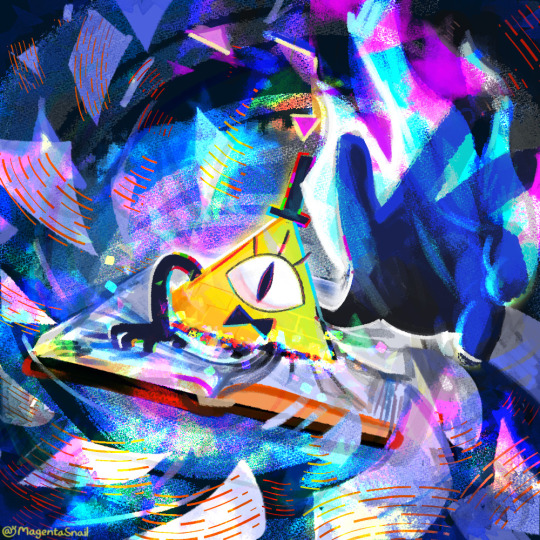
(Art by magentasnail)
Let's catch you up on the basics real quick. Again, there will be huge Gravity Falls spoilers.
In Gravity Falls, Bill Cipher is a yellow a 2-dimensional triangle demon bent on causing chaos.
Through the series, Bill makes deals with multiple characters to possess their bodies. This includes both gaining full control over the body of protagonist Dipper Pines for an episode, and more interestingly, sharing control over the body of Stanford Pines for an extended period of time.
Bill's possession of Dipper left Dipper outside his body like a ghost. But his deal with Stanford is much more plural in nature, where they shared control, with Bill only controlling the body in his sleep.
Obviously real plural systems don't have headmates controlling their body while they sleep like this, but the experience can be seen as analogous to dissociative identity disorder, where it's common to experience blackouts and "wake up" in situations unsure how you got there.
That's all you really need to know about Bill for the time being.
With that out of the way, it's time get weird and dive straight into the Book of Bill!

The Book of Bills
As I begin reading the Book of Bill, I'm given a warning from Stanford Pines that the book will rewrite itself based on the mind of the reader. This seems silly, and I of course dismiss the idea out of hand. Surely there's no way a book could change itself based on who's reading it.
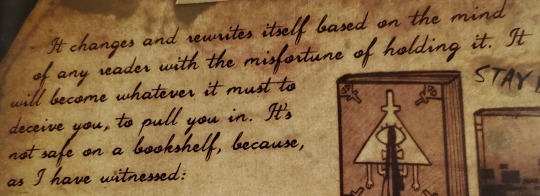
As I venture further into this tome, I find the occasional point of interest. References to Bill living in people's brain, him being an idea, etc.
I stop briefly to ponder that. Why does Bill refer to himself as an idea? Isn't he canonically a being from a physical 2-dimensional world? Him being described as an idea is peculiar, but something I tuck away for the future.
The first thing I find that really piques my interest in regards to plurality is the multiple times that it's just referenced that there are multiple Bills in Bill's head. Such as when Bill refers to "the voices in his head" teaming up.
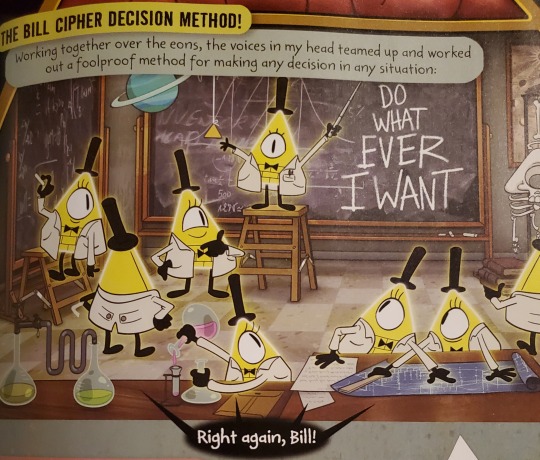
In the plural community, there's a concept known as median system.
A median system is typically a system which has separate parts that are less distinct from each other. There's a pretty solid case that Bill, having a bunch of Bills in his head, could be considered a median system on his own.
In fact, the book itself actually depicts communication between multiple Bills, in the form of an interview.
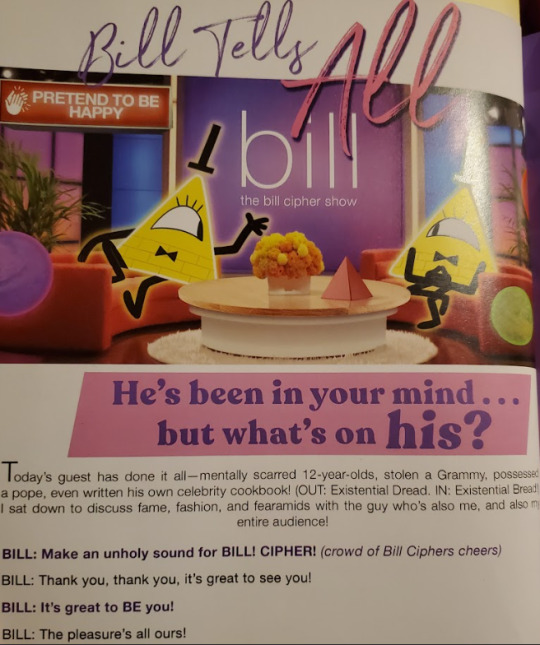
And throughout the interview, there are times where the Prime Bill seemingly gets annoyed at the interviewer's questions. As if they are actually different people. While this could be Bill simply duplicating himself and pretending for comedic effect, it could just as easily be that both Bills are headmates in Bill's system.
Bill being a median system is a pretty interesting direction.
As I read on though, the book dragged me down yet another rabbit hole, and raised an important question.
Does Bill Have A Dissociative Disorder???
Let's talk about dissociative identity disorder. There are two main criteria for DID. Criterion A is the presence of two or more distinct personality states. You know, like those Bills in Bill's head.
The second is memory loss.

Recurrent gaps in the recall of everyday events, important personal information, and/or traumatic events.
This is what was on my mind when Bill was describing how he was uniquely gifted with the ability to see into the third dimension, and wanted to teach others this same skill.
But when he tries to recount it... this happened...
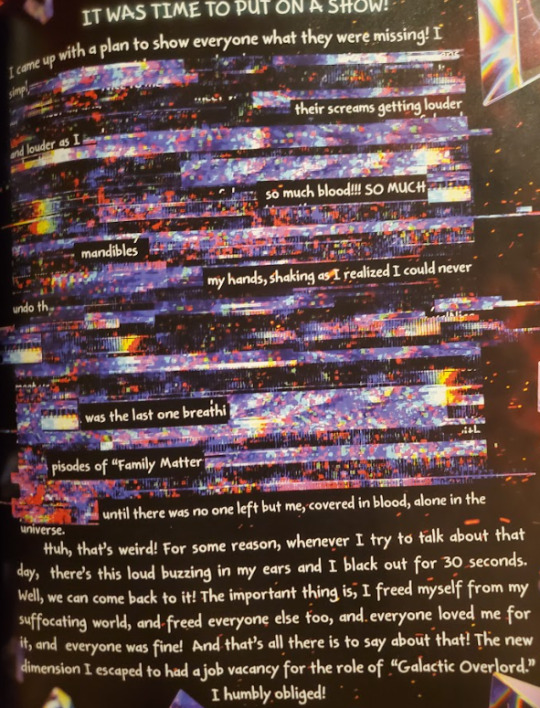
To me, this sounds exactly what was described in criterion B. This is also called dissociative amnesia.
And it's not just this one-off example. Bill actually references later that he dissociates (his words) and "wakes up" later after a conquest.
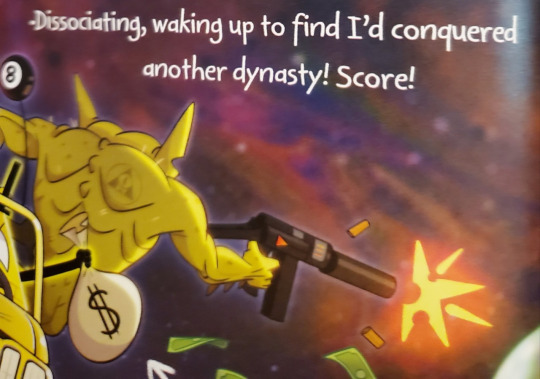
With everything we know, it seems incredibly likely that Bill has DID, or at least a related disorder.
Bill is what he eats
Okay... wait...

So Bill can ALSO imprison the souls of those he eats inside himself, and they can apparently take over Bill's body too???
What actually is going on here? Is this one of Bill's powers? He can just eat entire universes and then whatever he consumes becomes a part of him? Or maybe it's something else...
Maybe if we looked at this less literally and consider the previous hints of Bill having a dissociative disorder then perhaps what is going on is that Bill is introjecting these people.
Maybe whenever he enters somebody's mind, some piece of them remains...
I would love to speculate more on this... But this is the only mention of it in the entire book!
At this point, I begin to reflect on the words at the beginning. Maybe it was true that the book was changing itself to give me what I wanted. Little hints of plurality to keep me reading, to ensnare me in its vicious trap and ultimately drive me to madness.

And the worst part was, I was falling into it anyway. Because I had to know, even if this was a trap, I was in it to the very end. My thirst for knowledge and understanding unquenchable.
Even if I knew I should stop here, there was no going back.
Stanford Pines, Bill's Perfect Host
At last, beyond all of the misdirects that were put in my way, I arrived at the reason that I started on this journey.
Stanford Pines.
I need to say that when I started this journey, planning to delve into what the plurality of Bill and Ford might be like, I never imagined that it would be handled so... Beautifully.
I mean that genuinely!
I love the relationship of these two characters in the book!
They are both very out of place in their own ways. Both are aware of things in their world that are denied by others, leaving them ridiculed and ostracized for it. They manage to form a genuine friendship. Even if Bill was using Stanford the whole time to achieve his Weirdmageddon.
The two compliment each other surprisingly well. Bill provides Stanford with a friend who can get him out of his comfort zone, which is something that I think Stanford really needed.
There's a really fun part of the book where Bill just gets Stanford mind-drunk, which is apparently something he can do.
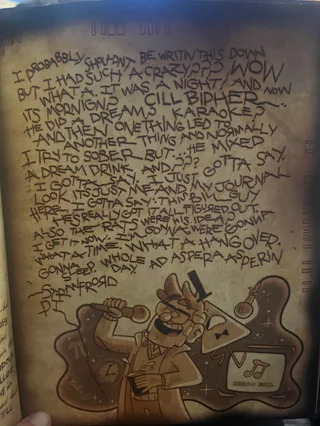
Bill fills a role in Stanford's life that nobody had since he lost contact with his brother. While Stanford had friend in with Fiddleford, his lab partner, and we do get to see parts of that friendship in the book, they are more like work acquaintances.
Alas, it wasn't meant to be. Because in the end, Bill is still an evil demon who was bent on bringing about the Weirdmageddon and was manipulating Ford the whole time.
And when Stanford found out, he tried to shut Bill out. This led to Bill trying to communicate through sticky notes to get Ford to stop ignoring him. He would front in the body at night while Ford slept, and they carried on a conversation through these sticky notes.
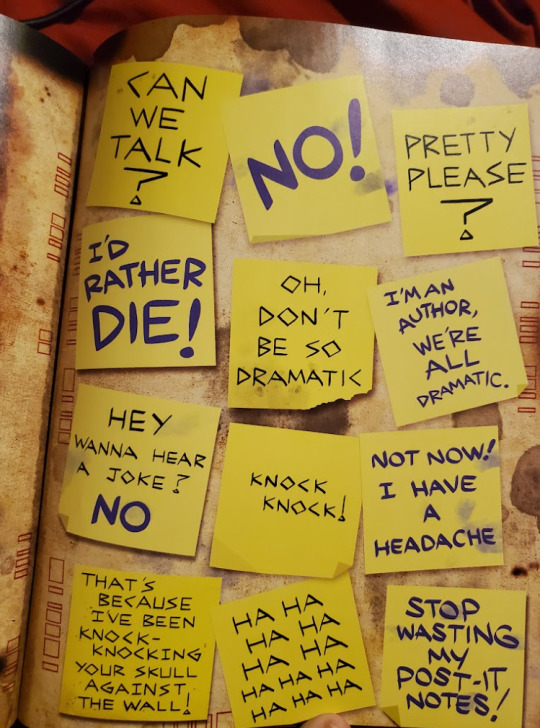
Wait... Sticky notes?
This is such an interesting choice for the character! Especially after so many hints of Bill Cipher having some sort of dissociative disorder.
Why?
Because sticky notes are an actual method that real DID systems use to communicate with their alters, as seen in this post from the NAMI (National Alliance on Mental Illness) website.

It's fascinating how, if you were to try to depict how headmates with strong dissociative barriers might communicate, this is one of the ways you would want to do that!
Is this coincidental? Maybe. But the talk of dissociation earlier suggests the author also has at least some basic knowledge of dissociation and how it works. And, perhaps, plurality as well?
Overall, this whole section with Bill and Ford was fantastic, and it was well-worth the read for that on its own.
The End?
I suppose this is the end. I found what I wanted. I got the content I was after. A cool plural story of a guy and his headmate from another dimension who wants to take over the world.
Through all the strange distractions and hints of Bill himself having headmates that seemingly went nowhere, I got more plurality in the book than I expected.
And yet, as I turn the final page of the book, I feel unsatisfied. Unsettled.
"Is that it?" I think to myself.
This is Gravity Falls, a show built on mysteries, and looking deeper than the surface. Surely there has to be more. Right?
What if... all the plurality in this book, is obscuring something deeper? Or maybe hinting at something deeper...
And then... I see it!
After the final page, I come to the About the Author section.
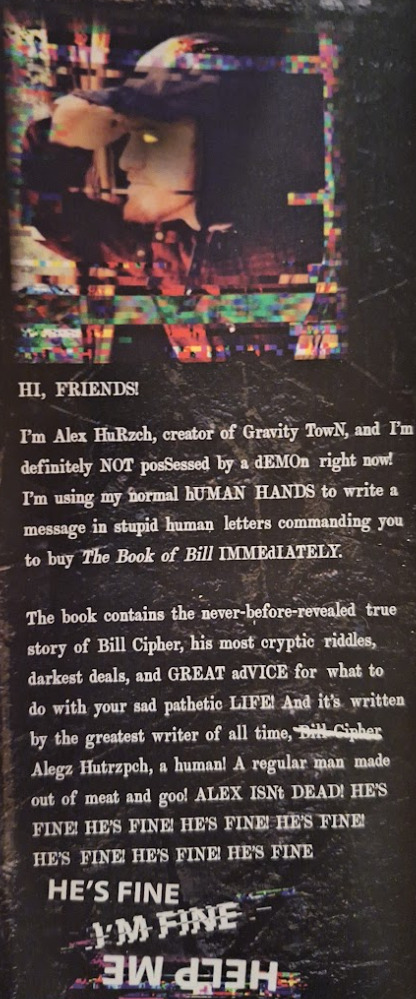
Which means it's time to talk about...
The Plurality of... Bill Cipher Alex Hirsch
Yes, I am going there!
In the beginning, I promised that this post will require me to break a rule I've held sacred through these posts.
That rule... is to never speculate on the plurality of the author.
But, Alex Hirsch, at least in a fictional sense, hasn't exactly shied away from the idea of being "possessed" by Bill. This dates back at least a decade, with him making Tweets like this one.

"Bill Cipher" even did an AMA on Reddit through Alex, playing it off as Bill possessing Hirsch while he slept.
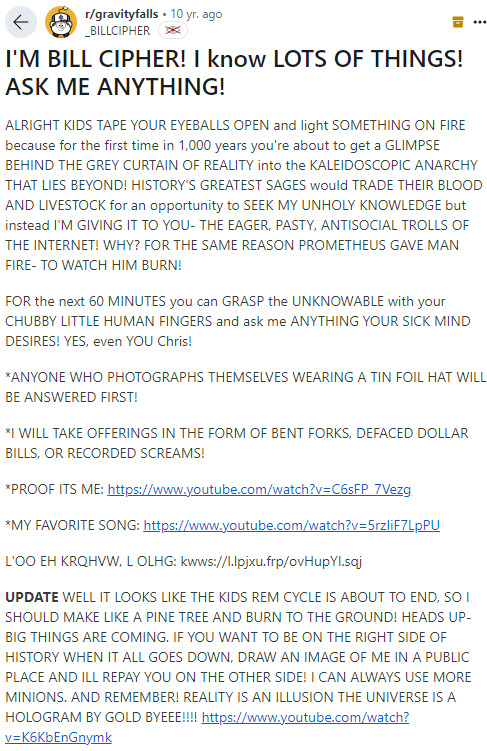
It's a pretty open secret in the Gravity Falls community that Alex Hirsch is "possessed" by Bill. At least in some meta-fiction way that may not be canon to Gravity Falls but isn't quite real either.
And were my analysis to stop here, I wouldn't really be saying anything new or valuable. A lot of this was covered by MatPat on Film Theory.
But there's something I want to go back to that confuses me in this book.
That Bill Cipher... is an idea?
Let's bring this full circle, back to the beginning of the book where Bill mentions that he's imaginary and describes himself as an idea.
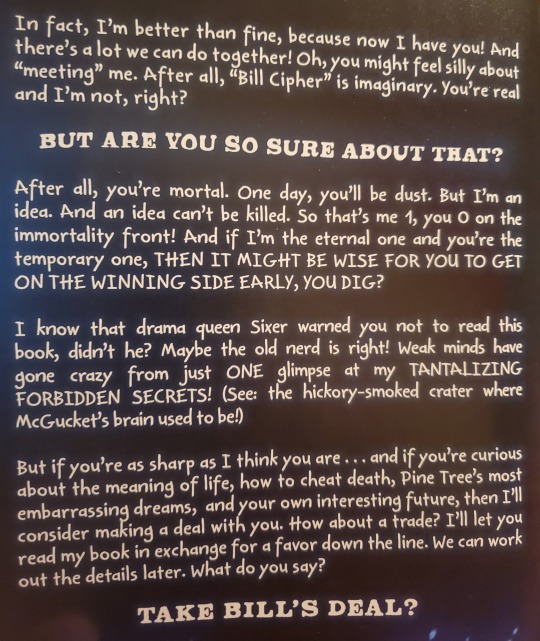
These are such weird lines because Bill didn't seem to have originated from people's minds within the narrative of Gravity Falls.
His story is of being a being from a literal flat world. So why then, does he describe himself as an idea? Why does he describe himself as imaginary???
Bill Cipher as Alex Hirsch's Tulpa
While Bill being an idea doesn't make sense if he's speaking as a being from a 2-dimensional world that's real to him, it does make sense if we consider that the Bill talking to us, who wrote the Book of Bill, is a tulpa sharing the body of its creator.
Before going on though, we need to answer an important question. What is a tulpa? The r/tulpas subreddit gives its own answer to this in its FAQ.
The simplest way to describe a tulpa is simply another person who was created intentionally/unintentionally through repeated interaction and shares a body and mind with their creator. A more complicated definition can go as follows: A tulpa is believed to be an autonomous consciousness coinhabiting a brain with their creator, often with a form of their creator's initial choice and design. A tulpa is entirely sentient and in control of their opinions, feelings, form and movement. They are willingly created via a number of techniques to act as companions, muses, and advisers. Tulpa forms can either be visualized in the mind's eye, or, with practice, seen as a hallucinatory figure using a technique called imposition.
And let's stop there on the line about being created as muses, because this is something that's found repeated throughout both The Book of Bill and Journal 3, with Stanford referring to Bill as his "muse."
It's a curious term that doesn't appear in the show, but was added to the lore in these two supplemental books.
The FAQ goes on to explain that while tulpas are often considered to be intentionally created, there are also accidental tulpas that can arise through imaginary friends or from writing characters.
Is it possible to accidentally make a tulpa? Yes - many people join the community after realizing they have had tulpas all their lives, but without knowing what they were called. These "accidental" tulpas often arise from imaginary friends and writing/roleplay characters.
On the point of roleplay characters, something I also haven't mentioned yet is that Alex Hirsch didn't just write the character of Bill Cipher. He WAS Bill Cipher. In the show, Bill is one of the characters Hirsch voices along with Grunkle Stan and Soos.
Writing tulpas and how they come about are discussed a bit more below:
Is this a new phenomena? No, it's a practice that goes back in recorded history at least as far as the Greek philosophers. The present name of the phenomenon is derived from the word used by Tibetan monks in the early 20th century. There's also evidence to suggest dedicated prayer can lead to the development of 'religious tulpas' in the minds of the particularly devout, and on the secular end, writing techniques similar to tulpa development techniques can and have resulted in writers creating accidental tulpas from their characters. Having a tulpa is nothing new, although it's gone by many names throughout the course of history and does so even today. However, we believe we are one of the first groups to address this practice as a psychological phenomena rather than a magical, occult or divine experience.
Tulpamancy and Attention
There was another passage from the book that I found noteworthy.
At the end, Stanford describes what truly sustains Bill isn't power, but attention, which Stanford describes as Bill's "lifeblood."
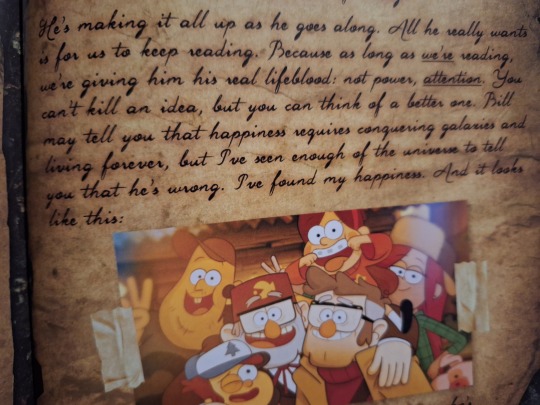
It's even underlined for emphasis.
Why is this important? Well first, this line goes back to the weird lines earlier suggesting Bill is an idea.
But more importantly, feeding on attention is something which is actually a pretty popular philosophy in tulpamancy. That tulpas feed on and are sustained by the attention of their hosts.
How do I give my tulpa energy? Tulpas are sustained by attention, and energy is a convenient metaphor for this. So, you can give your tulpa energy by interacting with them. It is also possible, through no shortage of work and time on the part of host and tulpa alike, for a tulpa to grow beyond this need and to learn how to sustain themselves.
How much attention/energy/interaction does my tulpa need? During the creation process you should aim to interact with your tulpa daily, anywhere from a few minutes up to a few hours, and narrating to them as and when you can. After they're fully vocal and active, the bare minimum is just acknowledging their existence, but spending time talking to them and interacting with them is very much the point of bringing them into existence. Just don't ignore them, and you'll both be fine.
On Parallels in Writing
Adding another layer, it's likely that Stanford Pines is at least partially based on Alex Hirsch himself.
One point of trivia is that Alex Hirsch has a twin sister, and Gravity Falls was inspired by vacations they would take as children. Dipper and Mabel being based on Alex and his sister is pretty well-known. But towards the end of season 2, it's revealed that their Grunkle Stan is a twin himself, with his brother being Stanford Pines, the author of the journals.
During this part of the story, it starts creating a parallel between the relationships of the younger and older twins, with Dipper (who is based on Alex) bonding with Stanford over how much they have in common. Both are nerds who are into writing and science and uncovering the mysteries of the world. Both are a bit socially awkward as well.
And while not much attention is drawn to this particular connection, both had experiences of making deals with Bill that let Bill takeover their bodies at different points.
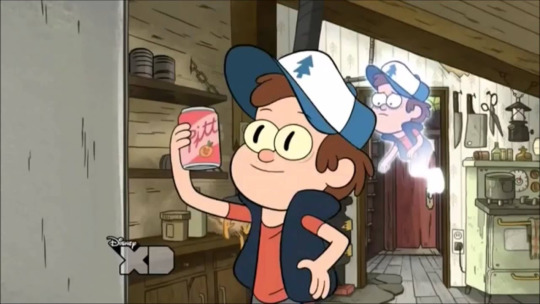
Based on the parallels between Dipper and Stanford, one might speculate that Alex based Dipper on his younger self, while Stanford was loosely based on himself as an adult.
The personalities of these two characters are also the most likely to create a tulpa based on the psychological profiles of most tulpamancers.
In 2016, Dr. Samuel Veissiere, a psychiatry professor at McGill University, found the following in his study of tulpamancers:
From coding of qualitative interviews collected in large surveys, the most common tulpamancer profile to emerge is one of a highly cerebral, imaginative, highly articulate, upper-middle class, formally educated person with many consistently pursued interests, talents, and hobbies, but limited channels of physical social interaction. Typical tulpamancers are confident about their talents, but are quite modest and socially shy. They possess – or have cultivated – a high propensity for concentration, absorption, hypnotisability, and non-psychotic sensory hallucinations.
The psychological profile of tulpamancers fits both Dipper and Stanford to a t. And many of these same traits could just as easily be true for Alex Hirsch if these characters were meant to be stand-ins for himself.
Is Alex Hirsch trying to tell us that he's plural?
In the end, this is just a theory. And it's one that I feel nervous making because plurality is so deep and personal. That's why I've avoided speculating on the plurality authors in the past. Even when the writing feels so true to the plural experience that it's hard to imagine that someone who isn't plural wrote it.
So why am I making an exception with this one?
Well, in this particular case, I think that the breadcrumbs are being left intentionally, and if he is plural, then he expects somebody to follow them. I'm not worried that I would be outing somebody who didn't want others to find out.
With Alex Hirsch's love of codes and clues and mysteries, if he were plural, I have to imagine that the hints weren't accidental and he would be wondering if anybody would follow them.
And if I am completely off base and he's not plural, I think that he would still appreciate the theorizing anyway. 🤷♀️
But if these are intentional clues that were left behind to hint at a real life plurality, one might ask why.
Why would he want people to know about it, and hint at it in this way?
Well, I think the Book of Bill might have an answer to that too.

Shame is a powerful emotion. But it grows in the dark. The more I've tried to hide my past with Bill, the more hold it's had over me.
Perhaps this line is meant to reflect Alex Hirsch's own feelings. Because many plural systems have felt this same way about their plurality, having hide their relationships to their headmates.
The actual end now
Finally, we come to the real ending of this.
This is, again, just a theory. I don't want anyone taking it as fact. I admit that I could be completely wrong about everything that I've said here.
But if nothing else, it's at least fun to imagine that Alex Hirsch does have a Bill Cipher tulpa in his head that has been acting as his muse this whole time. And it would give a new meaning to the gag of the Weirdmageddon intro saying Gravity Falls was "created by Bill Cipher" all those years ago.
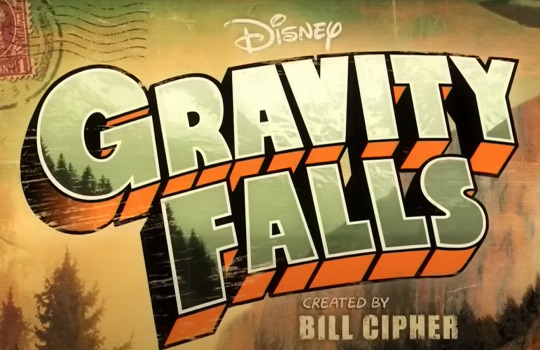
Thanks for reading, and if you have your own muse that you think might be more than a simple muse, be sure to read my guide on how to know if your imaginary friend is sentient.
And if you like this post and want to see more like it, you may want to check out The Plurality of… Avatar: The Last Airbender or The Plurality of… IF
#bill cipher#book of bill#ford pines#gravity falls#pluralgang#the book of bill#plural#plurality#endogenic#multiplicity#pro endo#pro endogenic#tulpamancy#tulpa#sysblr#disney#standford pines#endo safe#actually plural#actually a system
235 notes
·
View notes
Text
I wrote this post in a word document, and I named this document 'not got stabbed yet', so that's the theme today.
I mentioned someone was slashing my bike tyres in the park, and it happened two times in 4 days. I thought, you know, crazy park person was after me, and I need to stop going to the park with a bike, if I want to avoid this.
However, something else happened next. Something that truly chilled me. My bike tyre was slashed the day after, and I hadn't been to the park that day. Not even close. I've been to work, and then visited a store, for 5 minutes. Someone found my bike and slashed it either at my workplace, or at the store. Someone had to follow me to find it there. Someone knew where I worked and shopped.
The tyre had a very small hole, so it deflated very slowly, and I only realized it was flat after I got home. I didn't know whether it was slashed while I was at work, or at the store. I took the tube out to check it out, found no thorn or any natural signs of damage, and called the police again. I wanted to know if there was more reports of this happening.
This time I was in luck and got to talk to a police woman! So I was happy, and I was able to share more details, such as where, when, how many times it happened, she was willing to hear me out. However, she did not take it seriously. She told me somebody probably got offended that I parked my bike at the park, because it is 'the park', so they wanted me to stop leaving it there, and since the third time hole was so tiny, it was possible I just ran into a thorn. I allowed that it could not be ruled out, but it was incredibly unlikely since I was only riding it directly on the street, not any grass or branches, and I did not find a thorn inside of the tyre. Usually when I do run on a thorn, it will get stuck in the outer tyre.
I explained I was worried about being followed, and legitimately scared of going to work next day, but she said I can't shut myself in, I shouldn't be scared, I shouldn't let someone know they've managed to unnerve me with this! And I'm facepalming, thinking, what kind of girl power is this? Is a stalker gonna quit if the victim is not unnerved enough? Wouldn't that inspire them to escalate behaviour? I sighed and thanked her for listening to me.
There were no other reports, she couldn't even tell me if it happened before at all to anyone. I looked up online if there were records of it happening to anyone, anywhere, but only articles I could find were about mass slashing on one location, like one person slashing 30 bikes at once. It was never about just one person having it happen repeatedly.
I was thinking about what was the point of this, and decided if it's not a crazy revenge for something (and I don't know what, I don't have beef with anyone in the entire city), it has to be to stop me from using my bike. So I would have to walk. And be much slower. Much more easy to follow. And apparently I was already followed, if they managed to find my bike at my workplace. I was scared to go to work again.
To make things more interesting, I was at that point reading 'Career of Evil', which is jkr's book about a serial killer who stalks and murders women, and some of the book was written from the killer's perspective. This part helped me, because it revealed how it could actually be a bit difficult to attack a woman if she's only walking trough public places with people around, refusing to be out at night, refusing to go into dark alleyways or overcrowded bars and dance clubs. He couldn't do it out in daylight where there were witnesses. I had to stop and think whether this book logic could translate to real life, and if this holds out in reality. Can I protect myself just by being in open public spaces, in front of witnesses? Can I be sure I won't get stabbed if I stick to these rules? And I figured, yeah, that actually tracks, nobody will stab me in front of witnesses. And if I'm on my bike, it's harder to catch me. As long as I can quickly repair my bike every time and use it to get around, I should be safer than walking.
But I still felt unnerved about being followed, so I decided to go to work in a disguise. It was a different location and I didn't want to be followed there. I put together a jacket that was a different color than my usual one, put on a wig, different shoes, pants; it was obviously mismatched upon a close look, but if you saw me zooming by on a bike, you couldn't tell it was me.
Next morning, I nervously entered the workplace all costumed up, and people thought I was pulling a funny prank on them and were delighted. They insisted I stay in my new getup to show me to more people to get a laugh. They acted like it was the most fun thing I ever did. I played along, thinking how this is a convenient reaction, because I didn't want to take the disguise off immediately, for the chance that I'm still followed.
Later they asked me why am I in a mascarade, and I explained what happened. They then confirmed I'm definitely being followed, and started listing all cases where a woman got stabbed jogging or walking outside, which was just great to hear.
My bike remained whole that day, and I got home in my disguise safely as well. Now the question remained – do I stay home scared to go out all day? Do I just go around in a disguise everywhere? I needed to know why this was happening to me. And I felt sick of being scared and agoraphobic. So I made up a plan.
*
Later that same day, I went out with my bike in my usual outfit, bright and noticeable jacket, and my laptop in my hands. I went to the park. I carefully tied my bike behind where I was sitting, and opened up my laptop, which had a bit of tape covering the light from the camera. I was filming the bike with my webcam while I was on the laptop. It was almost obvious what I was doing, from the way I was sitting and leaning, but I was there to find out whether the tubestabby was a freaking idiot or not. Either he would fall for the trap, stab my tyre, get caught on camera, and I would know who did it. Or, he would do nothing while it's being filmed, and I could sit in the park, and do whatever I wanted to, safely.
My bike was fine half an hour later when I headed home, and I then had to review the footage, to see if anything happened. Bike was on camera the entire time, nobody came close to it, but also I was on camera, and while I was reviewing it, I had the crazy experience on seeing how my own face looks while I'm online, reading messages, scrolling trough tumblr. At first all I could see were my eyes moving left to right rapidly, I was speed reading, looking all scared and nervous because I did expose myself to a possible stalker and I was not having a good time. But as time went on, I saw myself breaking into smiles, because I had read something funny, and by the end of it I was just grinning and laughing, the internet humor broke trough my nerves and made me forget the fear. Tumblr is okay.
I was satisfied. I had been to the park, I wasn't stabbed, my bike was not damaged, and if I kept this up, I could be in the park and be safe by the means of obviously recording the bike. I can't do it at night time, as my webcam will not pick up a picture in the dark.
I'm not that spooked out anymore, I was freaked out when my bike was slashed the third time, and not even in the park. It is still scary that it's happening to me only, and I'm not targeted randomly among other people. And that it happened on a different location that nobody should have known I'd be on. If I catch the culprit it will take effort not to try and fight him immediately, because I am truly weak due to my impinged nerve and that guy has a sharp object. But he is a coward, destroying my stuff behind my back, never facing me and telling me what his problem is. I refuse to be scared of a coward with a sharp object.
#potential stalking situation#bike vandalism#being followed#crime mystery#personal#drama#the tubestabby#tubestabby saga pt 2
56 notes
·
View notes
Text
Not all kilts are created equal, either
At the rate things are drastically mutating, as far as cons and fan events are concerned, it would seem the most democratic way to meet, greet and grab an autograph from S is to swallow even the most remote idea of self-esteem and join the crowds on that Sassenach Winter Tour. Beat the pavement with the huddled masses and wait for Ginger Jesus to wink encouragingly, as your knees give way and you melt into a puddle of fuzzy love for... Ahem... no, let's hope not, my quill got the better of my reason, on this one.
This will go on and on and on, until the Last Living Woman on Earth ever to have been touched by JAMMF's self-evident charm will stop writing idiocies like this one:

You would never be able to compare Glenmorangie and SS, just like you wouldn't do the same about S and Harrison Ford, excuse me. At least if you would like to keep some modicum of integrity, here.
I am sorry, Ford and Glenmorangie did not copy anything. They just used a beloved piece of garment, the kilt, to their advantage. The rugged (but sexy and ultimately interesting and kind) Highlander in a kilt was not invented by Diana Gabaldon, nor definitively embodied by Sam Roland Heughan.
'Erself explained many times over she could have chosen anything else (aliens immediately came to my sick mind, but perhaps not the best option, after all) when she first started writing that damned book. But an old Dr Who episode, featuring a Highlander named Jamie McCrimmon and then a punctual subplot detail in Eric Linklater's book Prince in the Heather, mentioning Clan Fraser's only survivor after Culloden sealed the deal. I did not invent these, even Wikipedia knows 😉. In doing so, she simply (and wisely profitably, it would seem) chose one of the most popular and intriguing cultural tropes - Scotland. The rest was easy enough, but never forget that on a different inspiration whim, we could be talking all the same about Jaime, the Impetuous Pirate of the Caribbean (Voyager trivia, anyone?) or even Jacques, the French fin-de-siècle gentleman thief. That she chose Scotland is our delight (I doubt Shipper Mom wouldn't have zapped over a pirate series, after all), and S's lifetime lucky strike, that's all.
Scotland has been immensely popular and fantasized about, from The Borders to the Kamchatka Peninsula, ever since Walter Scott published The Lay of the Last Minstrel, in 1805, to rousing success. And even more so, since Queen Victoria and Prince Albert first visited and fell in love with it, in 1842. All things Scottish, from the tartan to the sense of honor, never ceased to fascinate people all around the world. The Outlander universe is just one of Scotland's latest representations in popular culture and, forgive me for being blunt, not even the best known one.
And excuse me once more, men in kilts have been around ever since, too. John Brown, Victoria's morganatic spouse, included. For better, rather than for worse. My own mind doesn't have to travel very far just to immediately remember Sean Connery, but here is an updated list of celebrities who apparently think the kilt is fashionable as hell and tells a very interesting story of virility and fortitude: https://help.scottishkiltshop.com/hc/en-us/articles/18545441581069-How-Hollywood-Celebrities-Embrace-the-Kilt . It's pleasantly enough written and makes for quite an instructive, updated overview of what the kilt really means in popular culture and how it is being constantly used to ventilate above positive messages & values.
To write that Ford used Heughan's persona in that #ad is akin to uninformed blindness. To go even further and talk with confidence about associative marketing is adding insult to injury and proving the person does not have the remotest clue of what she is writing about.
To cut the story short, associative marketing is simply a sales' strategy directed to minority groups and/or fringe communities. A classic example is Tupperware selling its plastic tchotchkes to moms all around the world and by doing so, peddling the dream of gifting them extra time for themselves (finally!). In other words, the focus of the sales strategy is being mindful about a specific set of needs and priorities that must be addressed. You are selling a product alright, but you are selling it to a niche. Glenmorangie is the opposite of that, in fact: it is a worldwide known brand, appreciated and enjoyed, sometimes excessively, by men and women (and frat boys and girls), irrespective of age, cultural context (yes, even in Tehran!) or social status. I honestly fail to see where the associative marketing can be found in Glenmorangie's poster and would rather think of Sassenach Spirits' own strategy in those terms. Especially when you think again about those huddled masses beating the pavement in front of a non-descript liquor store, on Main Street, America (or Industrial Zone, America, to be more exact).
Oh, well, she probably wanted to say Glenmorangie is coat-tailing Norouzi's genius ideas, which would be disingenuous, if not ridiculous, above anything else. But it surely is my deepest, secret and probably naively altruistic wish for this cheap Sassenach Tour gimmick to be shelved aside, before things become truly, heartbreakingly pathetic.
Make no mistake. I am such a loyal idiot that I am still confident. But the clock is ticking, and not to their advantage. So, is that it, is this how things are going to happen, from now on: extortionate fan events and #silly bottle signing sessions?
What would JAMMF, aka Jamie Roy, the Edinburgh spirits' smuggler, think about all of this?

60 notes
·
View notes
Text
Resources on Prieur de la Côte-d'Or
I decided it was about time to compile a convenient list with all the information and resources I could find about Claude-Antoine Prieur, also known as Prieur de la Côte-d'Or.
It's very much a work in progress: some posts, those without a link, are yet to be written. The list will be updated and edited with time.
♢ Biographies
Full books
Paul Gaffarel - Prieur de la Côte-d'Or, Librairie Noury, Dijon (1900).
Georges Bouchard - Prieur de la Côte-d'Or, un organisateur de la victoire, Librairie Historique R. Claveruil, Paris (1946).
(Not only I plan to transcribe both of them in a lighter, more readable format, but also to write a post comparing the two, though this should wait until I finish reading them fully. For now, from what I could see, none of the two could be considered a definitive Prieur biography: Paul Gaffarel didn't have access to Prieur's personal papers, resulting in a very incomplete work and inaccuracies; as far as Bouchard is concerned, he was no historian but a chemist and it shows both in his very superficial interpretation of the historical period in which Prieur lived and in the uncritical way in which he analyses primary accounts and sources about the latter.
For anyone interested in Prieur's life, I would recommend you to start from the 1946 one: despite the many criticism I personally have towards it, it's more complete, since Bouchard was granted access to Claude-Antoine's papers.)
Summaries
Timeline for Prieur's life
"Profile card" by @saintjustitude.
Translation of Gainot's entry on Prieur mentioned in Dictionnaire des membres du Comité de Salut Public
♢ Primary Sources
Correspondence and personal writings
Prieur's letter to Louis XVI on the importance of having a unified metric system in France
Prieur's letter to Guyton dated 10 Thermidor an II (28 July 1794)
Prieur's speech of 3 Germinal an III
Prieur's last written letter (to Simonne Frilley)
C.A. Prieur - Révelations sur le Comité de Salut Public (I plan to translate them all into English eventually)
Modern transcription of Prieur's first work on the metric system: Mémoire sur la nécessité et les moyens de rendre uniformes, dans le royaume, toutes les mesures d’étendue et de pesanteur
PNG Vector of Prieur's signature (by @senechalum)
Some excerpts from Prieur's first work on the metric system: 1. On the benefit of using the decimal scale 2. Conclusion of the memoir (summary of Prieur’s proposal)
Prieur's speech on the occasion of his admission to Dijon's Academy of Science
CSP decrees written and/or signed by him
Copy of the Letter of the Committee of Public Safety to the Directory of the District of Valence dated 19 Pluviôse [Year II]
♢ Secondary Sources
Camille Richard - Le Comité de Salut Public et les fabrications de guerre sous la Terreur, Rieder Ed., Paris, (1922) (A very interesting book on the warfare during the Terror (93-94), explaining Prieur, Carnot and Lindet's duties and contributions.)
Bertrand Barère on Prieur
Paul Arbelet on Prieur
Paul Arbelet - La jeunesse de Prieur de la Côte-d'Or, Revue du dix-huitième siècle (1916)
Bulletin de la Sabix - n°8 (décembre 1991) (it's a small journal written in French with some articles about the founding of the Polytechnic School and Prieur's role in it)
♢ Posts & Miscellanea
General tag on my blog
Prieur's personality: an introduction by @saintjustitude
Various portraits
Quotes (by him and on him)
Prieur's baptism certificate
Prieur's family crest
On Prieur's family
On Prieur's daughter (some additions by @nesiacha)
On Prieur's disability
Charles Bossut on Prieur's school perfomance at the École de Mézières
On Carnot and Prieur’s friendship (1, 2, 3, 4)
Prieur was never named Compte de l'Empire by Napoléon
On the mutual dislike between Prieur and Bonaparte
Historical inaccuracies in Arte's documentary Un mètre pour mesurer le monde
Prieur's contributions to the establishment of a new unified metric system
How Prieur and Carnot were elected members of the Committee of Public safety
Prieur's duties and contributions as member of the CSP
Prieur's contributions in the foundation and political defense of the École Polytechnique
Prieur's attendance at the CSP
Prieur's depiction in media
The bizarre legend about Prieur knowing that Louis-Charles Capet was freed from the Temple and substituted with another child
#frev#frev sources#prieur de la cote d'or#claude antoine prieur#claude antoine prieur duvernois#prieur de la côte-d'or#prieur duvernois#the amount of times i've written the word “prieur” makes me look insane D:#<- but i'm sane!! believe me!
40 notes
·
View notes
Text
relationships: robin x reader, sunday & robin, sunday & reader
notes: ambiguous relationships, implied mind control (not with robin/reader)
Robin is pretty particular about the people she wants to date, and has a certain modus operandi. Due to her cross-galaxy fame, it’s pretty much impossible for her to go on dating apps, at least via the usual channels. But she doesn’t want to limit her dating pool to just fellow celebrities, either. Masterful at disguises as she is, during first contact and first dates she has a tendency to hide her real identity, though she would never wait long before revealing herself. Even prior to how famous she is now, she has been burnt in the past by people being interested in who they think she is, rather than who she actually is as a person.
She has a special fondness for romance novels, and spends quite a bit of time discussing them on online forums. Online is one of the places she does not have to worry about how she presents herself, and she can gush in anonymity like anyone else. Thinking of a meet-cute is one of the few unrealistic dreams Robin allows herself, but perhaps she meets you through prolonged chatting online. Starting from your shared interests and underneath fake aliases, before spreading out to subject such as your actual lives and the people around you. Your friend is rather secretive, not giving out her exact name or showing pictures, but you assume it’s just in the name of privacy, until…
You: no waaaaaayyyyy You: where’s the /j?? birdie i swear lmao You: you’re kidding right You: or are you actually being serious?? wait wait ok You: ok if you’re serious. ily girl and no offense but like. send me a picture of you and a note with my username on it or smth? cuz im sure you can imagine it’s kinda hard to believe you’re THAT Robin
And she does! She sends you multiple pictures in fact, in multiple poses, to reassure you that the images aren’t A.I.-generated. When she apologises to you for hiding who she really is, she does it through a voice message, and you can hear one of the most envied voices in the galaxy speak just to you. It’s… Kind of overwhelming? But at the same time, it doesn’t change all that much.
She’s still your friend, who you’ve talked about to your struggles and gushed about your interests to, who always listens and always has a nice word to say. Who, if she has any faults, is always too hard to herself, never seeming to cut herself a break. Who always seems to be asleep at different times, and can disappear for days at a time. You thought she just had a horrifically wrecked sleep schedule, but this would explain that! Maybe it helps that, though you’re definitely familiar with Robin, you wouldn’t call yourself a fan or stan of hers.
When she confesses her feelings for you, it’s over the phone, a rare trembling enter his voice as she carefully considers her words.
“I’ve thought… A lot of times about how to put this. I still don’t really know how,” she says, laughing lightly. “I don’t want to lose what we have now. In my life, you’re one of the few people I can always turn to— Who I can show… Other sides of myself. I’ll just say it. It’s not really as romantic as the books we’ve read, but, I’ve fallen for you. Would you care to meet, sometime? And go on a date? I don’t want to pressure you, or feel like you have to do this. If you’re not interested, I still really, really would like to be your friend.”
There are a lot of conversations to be had when you begin to date Robin. It’s not going to be exactly easy. Not only do you need to be prepared to be put on blast on social media and feature in gossip articles, you’ll have to deal with the fact that she’ll be away on travel most of the time. Including to dangerous places, such as active warfronts.
This is something that, regardless of their love for you or anyone else, is integral to Robin’s life, and one thing she’ll never change. If that is something you cannot come to terms with and this reveals itself during your conversations, you’d be better off remaining friends. You can accompany Robin on certain travels, maybe even all of them, depending on the kind of person you are, but for a long while at least, Robin won’t settle anywhere permanently.
But if you manage to get through all of this, Robin is a wonderful girlfriend. She writes you letters and sends you gifts no matter where she goes, and makes time to call you at least once a day whenever she can. In interviews, she’ll bring you up as one of the people who give her strength, and her face lights up when she speaks of you. At events, she’d enjoy helping you dress up in whatever style you want, and constantly keeping your arms interlinked as you walk around.
While she isn’t all that touchy in public, she’d be clingy whenever it’s just the two of you. Making up for lost time together. Another thing she would enjoy is putting the both of you in increasingly elaborate disguises for public outings together! She has to make the fact she’s nearly always followed around by paparazzi fun somehow.
One of the largest ‘hurdles’ when dating Robin is, funnily enough, meeting her older brother Sunday. She speaks of him with nothing but affection and the occasional tinge of worry (though, when you tell her that she has the exact same kind of habits towards overworking herself, it’s suddenly not so bad after all).
Robin herself seems to have no fears that you won’t meet her brother’s standards, but you have your doubts, really. If your glances over the letters he’s written her are anything to go by, he loves Robin just as much as she loves him, if not even more so. While his approval is important to her, you’re certain that she would never break up with you over it, or anything of the sort. Still… You can’t help but feeling nervous.
Your worries aren’t unfounded. Over a dinner in Penacony’s Dreamscape, Sunday seems to scrutinise you, gaze boring into your forehead. All the time, there is nothing but a gentle smile on his face. Yet, you’ve never felt to be under such a strong spotlight, not even at events accompanied by Robin, walking across massive stages. Your head hurts, but you’re guessing it’s just from the general stress that you’re feeling.
As Robin laughs about the type of meal manifested on her brother’s plate (“An Alfalfa Salad for yourself? I really thought you would’ve gone for something sweeter, brother!”), you shift on your seat in discomfort and attempt to keep small talk conversations going.
Perhaps it’s your mind being tricks on you, perhaps you are ‘spiraling in on yourself’, as Robin sometimes calls it, but you really do believe that this man does not like you whatsoever. When you can’t take it anymore, you move your chair. Its loud scraping breaks up any conversation.
The smile on your face is wobbly. “I’m just going to go to the bathroom for a second. Excuse me.”
Robin puts her hand on your arm. “I can show you where it is? The mansion’s layout can be a bit confusing at times, even though I’ve been here plenty of times myself.”
Sunday, across the table, shakes his head and gets up. “Please stay seated, sister. As the host, it is my duty to guide your… Partner, to wherever they may need to go. Allow me to guide you.”
Somehow, your attempted escape has become a new trap in and of itself. It’s practically impossible to deny to go with him now, though, so you straighten your shoulders, nod, and follow Sunday further into his home. The clacking of his shoes on the marble floor is the only noise keeping you two company as you walk a step behind him. He stops. There is no bathroom, here. Only a giant paint of Robin situated on the wall. She’s smiling. Sunday turns half a circle around and stares at it, hands folded together behind his back.
“You…” he speaks slowly. “Do you think you can make her happy?”
Your head throbs. Your head hangs a little to the side, as you stare at the painting. “I think… When I met Robin, she was already happy. In a sense. She has a purpose. A goal she’ll always keep striving for— No matter what. Chasing that, I think it makes her feel more fulfilled than many people… Like me.”
You slowly shake your head. “So, no, I don’t think just myself could make her happy. But as things are now, she is. I do add something to her life, but… I don’t think the rest could be taken away.”
You stare at Sunday. If there is a thought that hits you now, in the painfully placid nature of his expression, in the manner he has watched you all evening, it is not merely protectiveness that fuels him. In part, it is jealousy, too.
You sway a little on your feet.
“You act as if Robin does not care for you,” you smile wistfully, turning to the painting in turn. “You don’t know how she talks about you, if you aren’t around. I think about it, sometimes. If you and I… Were hanging off of a precipice, and she could only save one of us— I can’t say for certain who she would pick. But if I’m honest with myself, as much as it would pain her, and how much it hurts me to think, I really do believe she would save you.”
You squeeze your eyes shut as the corners of your vision turn blurry. “I— I don’t know why I’m saying any of this.” You press your hand to the side of your head, and drag it down your cheek. “I’m sorry. I don’t think I’m feeling very well.”
“Is that really the truth?” Sunday asks.
“To me it is, I guess.” You mumble. “If you asked Robin, she would answer… That she would find a way to save both of us. No matter the cost. Because that is the kind of person she is. But I can’t seem to think that would be a reality.”
Sunday hums, then turns around you. When he nods, your nausea dissipates, you straighten your back, and whatever stupor you had found yourself in leaves your mind. All at once, shame crashes into you. What the hell have you been babbling on and on about for the past five minutes? When he looks at you now, his gaze is not quite as oppressive as before, though you are not entirely sure how to feel about him.
He lowers his head a tad, ears fluttering. “Thank you for allowing me to understand you better,” Sunday tells you. “You are a different type of person than I imagined you to be— Perhaps you and I are more similar than I believed. Due to my personal feelings, it seems I led my thoughts stray into disharmony. Will you forgive me?” Though the ice has left his tone, it is now as if he has shaved off every edge, covering it all in fabric. It is almost condescending.
But you, honestly, still kind of need to piss. And you’re over all of this, really. “I— Yeah. Yeah, sure. Spirit of harmony, and all that.”
Sunday smiles. “Well, then I believe a reintroduction is in order.” He extends his hand towards you, and you hesitate only a moment before taking it. “I suppose we are family now, too. Know that, whenever life’s troubles seem to be consuming you, Penacony will always opens its arms to you.”
#hsr x reader#honkai star rail x reader#robin hsr x reader#robin x reader#sunday#hsr sunday#reader#cha.robin#cha.sunday#cw.mindcontrol
84 notes
·
View notes
Note
Hello! rly appreciating your posts, in particular the ones about GLAM... it made me curious if you or your followers happen to have any resources/literature to recommend on 2 areas of interest?:
1. Relating salvage anthropology to modern day ideas of trauma porn
2. Palestinian-led museums/archives/oral history projects/other collections or exhibitions of note. (Or if not literature, any names involved besides the few I know of like POHA/the nakba archive/the arab resource center for popular arts; the palestine museum; librarians & archivists with Palestine; activestills; forever our land; and art for gaza)
Anyway, again, thanks for all the time/work you’re putting into analysis and info dissemination <3
hello, thanks for sending this in. sooo i have like. no idea about the first one haha but i have so many for the second one.
The Institute for Palestine Studies has a bunch of scholarly articles and anaylsis about Palestine
Librarians and Archivists for Palestine is not completely Palestinian led but it's one that I'm a part of and really like, even though you already mention it.
The Palestine Museum Digital Archive is an AMAZING resource led by Palestinians in Palestine. I recommend scrolling through their intifada posters, downloading them, printing them, and hanging them around town.
The Palestinian Oral History Archive project in case people were wondering what POHA is.
The Museum of the Palestinian People in DC is really great and has a lot of digitized features.
The Palestine Museum US has a lot of books as well, based on Turtle Island.
The Arab American National Museum is not Palestinian led but I can vouch that they're a great group.
The Met has a lot of Palestinian clothing BUT.... warning in that it is very colonial in its arrangement and description and we dont super know how people got the material they have. If you want to look at the content feel free, though. Will say that Wafa Ghnaim, one of the leading experts on Tatreez in Turtle Island is working on recataloguing the Palestinian collection.
Visualizing Palestine is an infographic organization that might interest you.
The Nakba Archive for people wanting to check it out.
The Library of Congress is. Honestly it's pretty racist but it does have content if you wanna look at it.
Tirazain is a tatreez pattern library that's really cool.
There might be more that I'm forgetting but here are some just from me sitting here thinking for the past few minutes. If anyone else has any recommendations, feel free to add.
226 notes
·
View notes
Text
A3! Troupe Event: MY WORST WEDDING | Event Story Translation (10/11)

Neither Japanese nor English is my first language so please forgive me if I made mistake. However, feel free to point me out, I’d love to hear your feedbacks on the translation ˶ᵔ ᵕ ᵔ˶
I recommend reading along in-game for this chapter to get a better visual for what's happening in the play!!
Translation under the cut
.・。.・゜✭・.・✫・゜・。.
Andrew: “I never thought James-san would get married.”
James: “I was also going to be unmarried, but I’m worried about what people would say then.”
Grayson: “What kind of person is your partner?”
Andrew: “The three of us took a picture the other day. Here you go.”
James: “She’s younger than me but she’s a sharp person. Perfect suit for a business partner.”

Andrew: “That sounds so businesslike. But it’s not bad to have someone waiting for you at home, isn’t it.”
Grayson: “I have no idea about how people would feel when they get married. Aside from being on duty, being with someone all the time is like hell.”
James: “That’s Grayson for you.”
*shifts to Ethan’s table*
Ethan: “She is my fated partner. I was sitting next to her at the cafe, and ever since our eyes met, I knew it was what was called love at first sight.”
Noah: “She looks just like an anime character, doesn’t she.”
Ethan: “Do you want to see the picture?”
Lucas: “Ah… But that’s why you’re getting married though. The genius graduating at the top of his class despite skipping grades is still in his teens, huh.”
Ethan: “N-not only that. She also has a nice personality, and we’re even on the same wavelength!”
Noah: “Even so, I thought the president’s son should be able to charter this whole cruise ship, shouldn’t you?”
Ethan: “This time, Olivia has arranged everything for me.”

Ethan: “I told her I wasn’t too interested in helding a bachelorette party, but she said I should definitely do it. She’s such a modest person.”
Noah: “I don’t think a modest partner would book a whole floor which costs this much though.”
Lucas: Well, isn’t that great to do this once in a while? Ethan, you didn’t come out and play much when we were students.
Ethan: “It’s because studying is fun.”
Noah: “By the way, who is the SP today?” (*)
Ethan: “There’s no way I’d bring any of them on a day like this.”
Noah: “Is that so.”
Izumi: (Azami-kun’s Ethan, I can feel like he’s really in love with Olivia. It’s completely different from when we started practicing.)
Andrew: “It seems that those guys over there also came to this bachelorette party like us.”
Grayson: “They look surprisingly young though.”
James: “That boy is…”
Ethan: “Cheers.”
James: “That sounds great, Bocchan. Congratulations on your wedding engagement.”
Ethan: “?”
James: “I just happened to hear your story.”
Ethan: “Aah. Thank you.”
James: “I guess there haven’t been any articles yet about the president’s son getting engaged?”
Andrew: “Yeah, if it happened to be seen somewhere,...”
Ethan: “My father is the only one who is well-known.”
Grayson: “There even seems to be some rumours about how much of a rare genius you are that you’ll be the next president?”
James: “I’m James, the secretary for congressman Brown.”
Ethan: “Nice to meet you.”
Noah: “Could it be that you guys are also enjoying the night before the wedding?”
James: “Aah. Such a coincidence.”
Lucas: “How old are you now, James-san?”
James: “I’m 32.”
Lucas: “Normally people are getting married at around that age. Ethan’s case is too early.”
Andrew: “Well, I also got married when I was 26.”
Ethan: “Because I will never find anyone who looks like Misaki and matches my personality like this in the future!”
James: “Misaki?”
Ethan: “Do you know the Japanese anime “One Hundred Poems, One People Each Reincarnated in a Different World”? (**). Misaki is a character in that series. Do you know it?”
James: “Hm–, I think I may have heard that name.”
Ethan: “Here, you can look at this photo of her! You will see they really look alike!”
James: “Heh… I’m not sure, but are they that similar?”
James: “Hm…? You said her name was?”
Ethan: “She is Olivia.”
James: “...”
Andrew: “James-san.”
Ethan: “Is there something wrong?”
James: “No, nothing. Please enjoy the party then—”
Grayson: “This woman named Olivia, doesn’t her name and face look just like James-san’s fiancée Olivia?”
Ethan: “Eh? That’s an odd coincidence—”
James: “Maybe it’s just a random resemblance to someone.”
Grayson: “No, it’s just the hairstyle and hair color that are different, but they’re the same person. You can put it into the analysis software.”
James: “...”
Noah: “So, what does that mean?”
Lucas: “Hm—, in other words, Olivia is gonna get married with two of you at the same time?”
Ethan: “N-No way! There’s no way that Olivia would marry such an old uncle. She said she likes men younger than her.”
James: “If you say that, then my fiancée also said the same thing. She said she has no interest in someone younger.”
James: “There is no way that she would make a mistake as marrying such a child.”
Ethan: “With all due respect, I am an independent person. Isn’t it too much to say “such a child”?
Andrew: “Anyway, why don’t you two ask your fiancée directly to confirm? Maybe they are twins who live away from others.”
Grayson: “Isn’t this a marriage fraud?”
Lucas: “I thought so too.”
Ethan: “That can’t be true!”
James: “We will know right after confirming with her.”
Ethan: “That’s right. Let me make a call to Olivia—”
Ethan: “What? There is no signal.”
Noah: “We could use wireless LANs though.”
James: “This is strange…”
Andrew: “My phone can’t connect either.”
Lucas: “It was connected until a while ago.”
Grayson: “James-san, the state at the floor is nowー”
James: “Get down!”
*The power suddenly went out*
Ethan: “ーー”

Noah: “Eh!? W-What!?”
Lucas: “A power outage!?”
*Grayson and Andrew put their guns out*
*Shifts to the ship’s hold*
Andrew: “Maybe that’s a hijacking.”
James: “There are too many enemies for a normal hijacking.”
Andrew: “This is strange. There wasn’t a single customer there a while ago.”
Greyson: “Right before the power outage, customers began to move all at once. This is no doubt a corporation.”
James: “I can’t say for sure yet, but it might be better to think that everyone except us is the enemy.”
Ethan: “W-What does that mean? What are they aiming for?”
James: “We still have no idea about it. Anyway, we should think about a way to escape this ship safely for now.”
James: “I will go first. Grayson will be behind me, and Andrew will be in defence of these three.”
Grayson: “Yes sir.”
Andrew: “Yes sir.”
Lucas: “You guys all have experience in the army by any chance…?”
James: “Aah. We’re friends in the same unit.”
Noah: “How reliable!”
Ethan: “W-wait a minute. In the first place, we don’t know if those guys are on the same boat with us or not.”
Lucas: “Now is not the time to say that.”
Ethan: “Like, even Olivia’s case is not still clear yet.”
Ethan: “I can’t trust someone suddenly saying that my fiancée, who is going to get married to me tomorrow, is the same person as his fiancée.”
James: “That’s the same for me too. I don’t mind if you don’t want to follow us.”
Ethan: “ーーW-Wait a minute!”
Andrew: “Isn’t it too bad to leave the president’s son behind?”
Grayson: “Our career advancement opportunities are gonna be out of reach.”
James: “...Tsk.”
Ethan: “For now, I’ll put Olivia’s case on hold. But that doesn’t mean I completely trust you.”
James: “This is why Bocchan is so troublesome.”

Ethan: “What?”
James: “No, nothing.”
Noah: “Uhmー, by the way, can I go back to my room?”
James: “We don’t have time to break now.”
Noah: “Ah, actually I’ve brought a drone here since I was thinking of using it for some photoshoot.”
Noah: “Even if the drone can’t connect through wireless communication now, it can communicate through infrared, and it has a camera too so wouldn’t it still be useful?”
Andrew: “It may be useful to watch the enemy’s movements.”
James: “There is a possibility that the cabin is now surrounded.”
Grayson: “Then I’ll be going.”
James: “If it’s impossible after checking the situation, give up and come back here.”
Grayson: “Yes sir.”
Izumi: (As expected of the ex-militaries. Thanks to the hair makeup, they look dignified and powerful.)
*Short timeskip*
James: “How is it? Do you find something?”
Lucas: “From the time being, the information recorded on the terminal can be easily obtained though…”
Lucas: “It’s gonna take a lil’ bit of time to get the information that requires access to the headquarters' database.”
Lucas: “Anyway, I’ll share this ship’s map that is quite useful.”
Noah: “Uhmー, I’m currently looking around the ship, but it seems like it’s gradually getting farther away from the port.”
Ethan: “It was supposed to return to the port overnight as planned.”
Andrew: “Where on earth is it heading to…”
Grayson: “I’m sure it’s not a good destination.”
James: “First thing first, let’s find a lifeboat to escape from this ship.”
Ethan: “In addition, in order to communicate with others outside this ship, we should look for the signal jammers.”
Ethan: “That’s no doubt the reason why the radio waves suddenly stopped connecting.”
James: “Then, let’s split into 2 groups. Grayson, preparing for the field. Lucas, please continue to analyze here.”
James: “And Noah, lend me the drone.”
Noah: “Ahー, the operation is quite complicated so only me can handle it.”
Noah: “Since the radio waves are blocked, you can’t control it unless you’re close to the infrared.”
James: “Then you go with Andrew and secure the lifeboat.”
Noah: “It’ll be like that after all…?”
Andrew: “I will guarantee your safety as much as possible.”
Noah: “I’m looking forward to working with you…”
James: “I will go find the signal jammers.”
Ethan: “What should I do then?”
James: “Bocchan should have some tea here.”
Ethan: “ーーI’ll go with you, James-san. I’ve learned self-defense and gun shooting, so we’ll work in pairs.”
James: “Do as you wish.”
Izumi: (Their blatant hostility towards others is perfect. It’s the kind of relationship that only works because it's Azami-kun and Sakyo-san.)
*Shifts to the cabin*
James: “Stop!”
Ethan: “ーーTsk.”
James: “If you didn’t come here to be a handicap, then at least don’t get in my way.”

Ethan: “...Depending on the function of the signal jammers, there are several patterns of placement to cover the vast interior of the ship."
*James & Ethans run*
Ethan: “However, no matter which pattern is, there should always be one placed around here. It’s not that way.”
James: “Does that mean you've simulated all the patterns?”
Ethan: “It’s not that I’ve simulated all of it before. You can get it right away once you look at the map.”
James: “I see. Seems like “genius Bocchan”' isn't just for show."
Ethan: “Can you stop calling me Bocchan.”
*Short timeskips*
James: “ーーApparently, your reading is correct. It’s a bingo.”
Ethan: “Once we stop this jammer, we can at least call the police from here. Nowーー”
James: “Wait. It comes with a bonus.”
Ethan: “?”
James: “A bomb. If you touch this carelessly, the bomb will explode.”
Ethan: “If that happens, its effect on the ship willーー Don’t tell me, the other jammers also have a bomb with it?”
James: “The possibility is high. Maybe they’re planning to sink this ship.”
Ethan: “That’sーー”
James: “We will go back for now. I’m also curious about Andrew’s report.”
*Back to the ship’s hold*
Ethan: “All the lifeboats are gone?”
Lucas: “Then how are we gonna escape from this ship.”
Grayson: “That means the bombs are all bluff?”
James: “No, they didn’t look fake at all.”
Ethan: “Unless they are planning to go down with the ship, their comrades are probably supposed to come pick them up.”
Ethan: “Once they accomplish their goal, won't they contact their comrades and sink the ship to destroy all the evidence?”
Noah: “What do you mean by their goal…?”
James: “Their goal is undoubtedly one of us, or even all of us. There were no corpses around this ship, and no one was running away except us.”
Noah: “What should we do then if there is no way to escape or contact the outside?”
Lucas: “It’s an escape game for real.”
Ethan: “Not something we can joke about.”
James: “For the time being, if we can clean up all the enemies, we can spare some time until the bombs explode.”
Ethan: “Please don’t say that easily.”
James: “If Bocchan doesn’t get in the way, we can do it.”
Ethan: “If that’s the case, let me tell you thisーー I think taking control over the cockpit and heading to the port would be faster than dealing with all the enemies.”
Ethan: “Calling for backup and escaping would take time, but if we get closer to the port, we might be able to escape.”
James: “Well, it’s worth a try. Then, are you going to tag along with me again?”

Ethan: “Yes, of course. I haven’t completely believed in you yet.”
James: “Andrew, follow me. Grayson, continue to take care of this place.”
Andrew: “Yes sir.”
Grayson: “Yes sir.”
Izumi: (Noah, the robot enthusiast, and Lucas, who’s into hacking, make a great brainy team. Compared to the former militaries team, it gives a really interesting feeling.)
*Shifts to the cabin*
SP: “Ethan! Where are you! I have been hiding due to the president’s request! Are you alright!?”
Ethan: “That isーー An SP. I’ve seen his face before. What a relief, we are saved! I’m right here!”
James: “Waitーー!”
SP: “I’m glad you’re safe… Finally caught you.”
Ethan: “?”
Andrew: “ーー”
James: “Wait. Now is not the time to show your face.”
Ethan: “Let go of me! What are you going to do!?”
SP: “If you value your life, be quiet and behave.”
Ethan: “You tricked me!”
Andrew: “...” James: “It’s okay. He didn’t shoot Ethan.”
Andrew: “Their purpose is kidnapping, isn’t it.”
James: “In that case, there is no need to involve us in this.”
Andrew: “There seems to be no doubt that Olivia is also involved.”
James: “...Leave questioning for later.”
*Shifts to the main hall*
SP: “...Contact headquarters.”
Terrorist A: “It took an unexpected effort.”
Ethan: “...”
*The phone rings*
Ethan: “!?”
SP: “Answer it.”
Ethan: “Eh? Can I?”
SP: “If you say anything thoughtless, I’ll kill you right away.”
Ethan: “...Understood.”
Ethan: “Oliviaーー Are you there?”
Olivia: “Yes. I’m sorry.”
Olivia: “I didn't intend to disturb you today, but I have something that needs to be checked about tomorrow’s wedding arrangements.”
Ethan: “That’s not the point! Nowーー”
*Sounds of bullet being loaded*
SP: “...” Olivia: “What happens?”
Ethan: “N-No, nothing.”
Olivia: “Is that so? By the way, I just got a call from the venue, and it seems the flowers we ordered won't be arriving.”
Olivia: “White is okay, but if there has to be some mix, which one would be better, pink or red? Considering Misaki's image, maybe purple?”
Ethan: “Ah, that’s right…”
Olivia: “Ethan also thinks so? What a relief! Then, I’ll contact the staff right away.”
Ethan: “Rather than that, I want to ask you something.”
Ethan: “Do you know James? He is the secretary for congressman Brown, and he is going to have a wedding with you tomorrow…”
Olivia: “With me? Who?”
Ethan: “It’s James.”
Olivia: “What are you talking about? You’re the guy who will have a wedding with me tomorrow, Ethan. Could it be that you're starting to regret your last single night?”
Ethan: “You really don’t know him?”
Olivia: “I don’t know what you’re talking about. You’re drunk, aren’t you.”
Olivia: “Show your face properly tomorrow, okay? I'd never want to stand alone at the venue just by myself.”
Ethan: “Y-Yeah. I already know it.”
Olivia: “Then. Good night. I love you.”

Ethan: “ーー”
SP: “That’s fine. If you obediently listen to what I say, I won't’ take your and your friends’ lives.”
Ethan: “Really?”
SP: “However, there is 1 condition. Bring James and others to the cockpit.”
Ethan: “Eh?”
SP: “You were aiming to take control over the cockpit, weren’t you? Unfortunately, this ship is controlled from the outside.”
SP: “If you try to touch the equipment, it’ll explode.”
Ethan: “No way…”
SP: “I’ll release you, so bring James and others. If you do that, I’ll save your and your friends’ lives.”
SP: “You know the location of the cockpit right?”
Ethan: “...I know it.”
*Sounds of shooting gun”
James: “Ethan!”
*Sounds of loading bullet and shooting gun*
SP: “ーーTsk.”
*They starts to shoot guns towards others*
James: “Come here!”
Ethan: “ーー”
*Shifts to the cabin*
James: “Any injuries?”
Ethan: “I’m fine… But why…”
James: “I can’t leave the president’s son alone.”
Ethan: “...”
James: “What’s wrong?”
Ethan: Oliviaーー No, there’s nothing.”
James: “There is no doubt that woman is involved in this incident. I understand you have lingering feelings, but you need to let her go. Their goal is to kidnap you."
James: "Most likely, they plan to use this as leverage to negotiate with the president. Once they're done, they might sink this ship along with everything."
Ethan: “...”
*Shifts to the ship’s hold*
Lucas: “Welcome back. I was finally able to break into the headquarters’ database.”
Lucas: “For the time being, what seems to be useful in the current situation is the number of enemies and the wiring diagram. And here is the list of enemiesーー”
Ethan: “Thisーー”
James: “As expected, Olivia is one of them. She must have gotten close to us to gather information.”
Ethan: “That’sーー”
Noah: “W-Well, at least you found out before getting married.”
Lucas: “You may be killed the moment you know it.”
James: “What should we do now? Shall we aim for the cockpit again?”
Ethan: “The cockpit on this ship cannot be used. They said that the control is completely left to the outside.”
Ethan: “In other words, it’s impossible for the terrorists to escape unless they are picked up by their comrades. There is no point in annihilating the cockpit.”
James: “...And?”
Ethan: “They promised me to save our lives on the condition that James-san and others were handed over.”
Ethan: “If their goal is to kidnap me and leave the ship, then I'll let them achieve their goal and make the call for the pickup.”
Ethan: “ After that, we'll hijack the rescue ship. That’s the only way.”
James: “That’s fine. It’s a great strategy for Bocchan.”
*Shifts to the cockpit*
James: “? What does this mean? There is no one hereーー”
Terrorist B: “Don’t you dare to move.”
Andrew: “ーー”
James: “We are surrounded.”
SP: “Thank you, Ethan. You saved us.”
Ethan: “...”
James: “Ethan?”
Andrew: “Did you betray us?”
SP: “There are 3 people here. What about your other friend?”
Lucas: “We disagreed on betraying James-san and the others this time. We had a falling out.”
SP: “Well that’s fine. 1 student doesn't make much of a difference. Let's quickly take care of the three of them."
James: “...Didn't you notice that one of the bombs you carefully planted all over the ship is missing? If you shoot now, we will die together.”
Terrorist B: “There’s no wayーー”
Terrorist C: “That’s fine. Leaving you here would lead to the same result anyway. Contact headquarters. We're withdrawing."
SP: “Originally, we were supposed to let the son go down with the ship as well.”
SP: “Negotiations are gonna take time, so you'll be coming with us. Consider yourself lucky.”
Ethan: “In other words, James-san and others' terms didn't matter at all?”
SP: “You made things easier for us. But honestly, you were more persistent than we expected and it was troublesome.”
Announcer: “10 seconds left until the explosion.”

Terrorist B: “!?”
SP: “What the heck is this drone? Something like this wasn't part of the planー”
Terrorist C: “More than that, what on earth is the “10 seconds left until the explosion”ーー”
SP: “Don’t panic! Shoot it down!”
Ethan: “That Noah guy, even if you said you’re going to use it to get their attention, this is…”
James: “That’s enough.”
*They start shooting guns towards others*
Terrorist B: “Urgh!”
SP: “Youーー!?”
James: “You two, lie down!”
Ethan: “Y-Yes!”
Lucas: “How many times do I have to come close to dying in just one night…!”
*Shifts to the cabin*
Noah: “There are several small boats moored side by side. Only the driver is on board.”
James: “Well, they will have to carry lots of people. Alright, let’s go.”
Ethan: “What do you mean by going, how do weーー”
James: “Jump!”
Ethan: “Eh!?”
Andrew: “Hurry up!”
Noah: “Hehhhhh!”
Lucas: “How many times do I have to come close to dying in just…!”
*Shifts to the lifeboat*
James: “Who's in charge of the steering?”
Ethan: “I have the license.”
James: “Then, I’ll leave it to Bocchan.”
Andrew: “Haa… It was a hard bachelorette party.”
Grayson: “If it's a training, you should have told me earlier.”
*The bomb explodes*
Noah: “Uwah, it really exploded.”
Ethan: “That was a close call.”
Lucas: “I wonder how many times I’ve come close to dying in just one night. Please give me a break from this real life escape game.”
James: “We’re escaping right at dawn.”
Ethan: “What are you going to do with today’s ceremony?”
James: “Bocchan, what is your plan?”
Ethan: “I’m going.”

James: “I’m also going as planned.”
Lucas: “Are you out of mind?”
Noah: “You must be kidding!”
James: “Please take good care of me, groomsmen.”
Andrew: “I thought you would say that.”
Grayson: “It can’t be helped.”
Noah: “I don’t know what happens anymore!”
Lucas: “I don’t wanna die yet…”
*The phone rings*
Izumi: (From now, during an audio-only call, Ethan and James will have a quick change)
Ethan: “Are you there, Olivia?”
Olivia: “Ethan? Where areーー”
Ethan: “We’re almost at the port. The ship was delayed a bit, but it's okay. There's nothing to worry about.”
Olivia: “...Is that so?”
Ethan: “Because I’ll be on time for the ceremony.”
Olivia: “E-Ehh. Wait for me a minute.”
*Arriving at the port*
Lucas: “Why do we need to bother dressing up formal when it's just going to get dirty anyway...”
Grayson: “It seems difficult to move.”
James: “You can't show up at a sunny wedding in a wrinkled suit.”
Ethan: “It might feel better if you get it completely dirty later.”

Andrew: “You two are really a good match.”
Audiences: “!!”
Izumi: (Alright, these two’s quick change is a success! The audiences were surprised. The rest is…)
Noah: “We just need to stall until the police arrive, right?”
Noah: “I brought as many drones and robots as I could, but they're not really meant for combat against people to begin with.”
James: “That’s enough to create distraction.”
Ethan: “Sorry for making you both come all the way here.”
Noah: “It can’t be helped, right. If I’m the only one not here, they'll probably get suspicious, and if I end up being alone, that could be dangerous too."
Lucas: “So I’ll hide with Noah and support him.”
Grayson: “Let’s finish all these things soon.”
Andrew: “I’m sleep-deprived after all.”
James: “Ethan, have you prepared your vows yet?”
Ethans: “It’s all in my head.”
James: “Very good. Let’s go.”
Izumi: (Now Noah and Lucas will step back, and Taichi's quick change and makeup... We've practiced so many times, so it should be fine.)
*Shifts to the ceremony hall*
Terrorist D: “They came!”
Terrorist E: “Kill all of them except the president’s son!”
Andrew: “We've got some dangerous guests gathered here.”
Grayson: ”You should be more careful choosing who you date.”
James: “That’s painfully true.”
Terrorist D: “You’re causing us trouble!”
Ethan: “That’s my line!”
Noah: “Ready?”
Lucas: “GO!”
*The robots start intruding*
Terrorist E: “!? W-What the heck are these!?”
Terrorist D: “Damn it, I can’t see anything!”
Andrew: “It's rude to cause violence in a church.”
Terrorist E: “Urgh”
Grayson: “Guess it's perfect for a confession.”
Terrorist D: “Ughh”
Ethan: “It was supposed to be the best day of my life!”
Terrorist F: “ーーUgh”
James: “And now it has become the worst day of my life.”
Terrorist G: “Urrghーー”
Olivia: “You really came. I’ve been waiting for you.”

Ethan: “Olivia!”
Audiences: “!?!?”
Izumi: (Okay, a success! I can tell that the audiences are now gasping)
Olivia: “I love you, Ethan.”
Ethan: “Olivia, Iーー”
Olivia: “That’s why behave yourself.”
*Olivia loads the bullet*
James: “Ellude, Ethan!”
Ethan: “ーー”
Olivia: “ーー”
Olivia: “Tsk. You're really tight-lipped and overly cautious, such a boring man, James!”
James: “Who was the one saying she liked that about me.”
Ethan: “Olivia, these are all lies after allーー”
*Ethan fights against Olivia*
Olivia: “ーーUgh”
Olivia: “I didn’t know you could do something this rough, Ethan. You’re much more charming now.”
Ethan: “You’re terrible! It was! Supposed to be! My first love!”
*They start to fight against others*
Olivia: “Tch, stop shouting! This is why I can't stand kids!”
Ethan: “ーー”
James: “Well, there was at least one truth in what you said. Goodbye now.”
*James shoots Olivia*
Olivia: “ーーUrgh”
*Olivia passes out*
Ethan: “Olivia!”
James: “She hasn’t dead yet. It’s a tranquilizer gun. I guess she was trying to shoot you with that.”
Ethan: “...”
James: “Ethan, how about the vows?”
Ethan: “In sickness and in healthーー”
James: “To honor and cherish each othersーー”
Ethan: “And be faithful to others as long as we both shall liveーー”
Ethan: “There’s no way I could swear that!”

James: “Bastard.”

*They both throw away the rings*
*Shifts to the port*
James: “After all, marriage doesn’t work like business.”
Andrew: “Obviously.”
Grayson: “But I thought marriage might not be that bad.”
James: “Where in all of this can you think that way?”
Ethan: “Haa… I even thought that was my soulmate…Next time, I'll take more time to understand the person before getting married.”
*Noah and Lucas appears through video call*
Lucas: “Please do so.”
Noah: “I’ll tell you this, I’ll never go to the bachelorette party again.”
James: “Well, you should work on improving your judgment of people, Bocchan.”
Ethan: “The same to you.”
*Shifts to Mankai Stage*
Audience A: Azami-kun and Sakyo-san being buddy were so cool!
Audience B: Isn’t it!? I even did a triple take because these two are both blonde!!
Audience C: Taichi-kun’s dual role really surprised me!
Audience A: The quick change and makeup were really amazing~!
Audience B: Speaking of which, the ex-militaries team is insane. They’re so cool.
Audience C: The Ethan team gave the greatest nobility!
Azami: Thank you for coming this timeーー Thank you so much!

Sakyo: Thank you!
Sakyo’s mother: …
Miyako: Onii-chan, you were so cool~!
Sakyo: ーー.
Sakyo’s mother: Azami-kun too!
Azami: Thanks…
Azami: (To be honest, I didn’t understand what is love or true love but…) (***)
Azami: (Perhaps living with this kind of compassion and supporting each other... is what true love is)
Azami: (This, what am I thinking…)
Sakyo: Why are you giving me that look? Let’s go all out with fanservice!
Azami: Annoyingー.
Azami: (Well, it’s okay once in a while. Only once in a while)
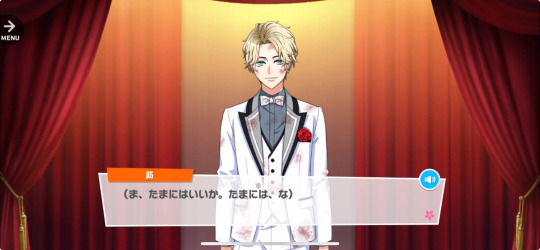
Translator’s notes:
(*) SP stands for Security Police.
(**) I think this is a reference to the Ogura Hyakunin Isshu (百人一首) - a classical Japanese anthology of 100 Japanese waka by 100 poets.
(***) Love is for 恋 (Koi) and 愛 (Ai) is True love.
.・。.・゜✭・.・✫・゜・。.
Previous || Next
#a3! translation#autumn troupe#autumn troupe’s 10th play#my worst wedding#my worst wedding translation#act addict actors
31 notes
·
View notes
Text
Hamilton: The Energetic Founder by R.B. Bernstein- A Book Review by a Teenage Know-It-All
In general, when an author refers to the Founding Fathers as "The Founding Guys" in the dedication page of his novel, my hopes are set pretty high from the get-go. I found this book while taking shelter in the Harvard Bookstore after a particularly distressing bus ride with my mother, so my judgment could have been clouded, but I actually don't regret this purchase.
Bernstein's book is short, concise, and comprehensive. While you may not be bored to death with every available anecdote about Alexander Hamilton as some authors (who will remain nameless until later) would want you to be, someone with limited knowledge of the bastard founder would be substantially educated after reading this easy 100 page read (not including the preface or epilogue).
Preface and Acknowledgments
You could not pay me to read anyone's preface or acknowledgments unless it is under 20 words. Bernstein's was not, so it won't be included in my review or in my household.
Chapter 1: Life
Early Life
I hate to say it, and you hate to hear it, but Bernstein's novel has very minimal footnotes (not at the bottom of the page, can't slip that past me), only being used for direct citations. So, there is no telling where he got the birthyear of 1758 for Hamilton because it's not cited. However, to his credit, he refers to an ambiguous "latest major biographer", and I admire anyone who does not invoke the name of the devil.
When it comes to the argument about Hamilton's birth year/age, it depends largely on which sources you believe are more credible, as well as which explanation for the discrepancy between them that you believe is most viable. It also depends on whether or not you believe Hamilton, who continuously used the 1757 year that has been considered truth by many. However, this was only used by Hamilton after his college years, and that is an important distinction.
On April 6, 1771, a teenage Alexander Hamilton submitted a poem to the Royal Danish American Gazette and, wanting to seem just a little older than he was, he summarized himself as "...a youth about seventeen..." Doing some simple math with an overqualified calculator and the knowledge that Hamilton was an insecure 16 year old, we can calculate from those numbers that Hamilton was born in 1755.
Source: Founders Online, Alexander Hamilton Papers: Alexander Hamilton to Royal Danish American Gazette, 6 April 1771. This document also includes Hamilton's first recorded poem, which is very interesting and a worthwhile read to understand his developmental years.
When Hamilton arrived in the continental British colonies in 1773, the age he gave in the above letter would put him in Boston Harbor at the age of 18- far to old for college in this time period. The exact age of entry and graduation is not precise, but it can be estimated that students would enter in their early teens (around 13-14) and graduate before they turned 17. That makes an 18 year old Hamilton far behind his would-be graduating class.
Source: University of Pennsylvania, Penn Libraries, "Penn in the 18th Century: Student Life". I thoroughly enjoyed this article, and it answered some more questions about what exactly college entailed in the 1700s, which is far different to the modern system as there was very little organized educational systems outside of these colleges and universities.
The running theory among recent historians is that Hamilton aged himself down two years (changing his birth year from 1755 to 1757) in order to apply to the College of New Jersey (modern day Princeton), which was the obvious path for him given that he was living in New Jersey and had several alumnus as mentors. Of course, we all know the story of him being denied access to Princeton after requesting an advanced curriculum*, so this detail of the age-change could fit into this attempt to get into the school on his terms. Since 1757 was now his documented birth year, it makes sense that he would continue to use that year throughout his life, as to not confuse his family, friends, and colleagues.
*According to Hercules Mulligan, Hamilton wanted to advance through the standard curriculum "with as much rapidity as his exertions would enable him to do. Dr. Witherspoon [President of the College of New Jersey] listened with great attention to so unusual a proposition from so young a person and replied that he had not the sole power to determine that but he would submit the request to the trustees who would decide." (Source: Alexander Hamilton by Ron Chernow; The William and Mary Quarterly, April 1947). Hamilton remedied this by applying to King's College (modern Columbia) and was enrolled as a special student who was tutored privately and audited necessary lectures as according to the president, Dr. Miles Cooper.
Despite all this, I have never come across 1758 as a possible birth year for Hamilton- nor have I 1754 or 1756. The issue is decidedly between 1755 or 1757, and Bernstein's lack of citations does not wholly reflect badly on his credibility, but it is disappointing because it just leaves me wondering where he got those numbers from.
The American Revolutionary War
The book does generally suffer from this lack of citation/elaboration for the sake of clarity, particularly in instances like on page 5, where Bernstein writes, "After months of organizing and training his artillery company, which he financed with the remainder of the funds meant to pay for his college education..." I have not seen any other documentation that Hamilton financed his artillery company with his educational funds, so knowing where this statement comes from would be greatly beneficial, but any citation that might elaborate on this does not exist.
There are also issues with Bernstein's timeline, along with a few dates being off (such as claiming Hamilton was invited to Washington's military staff in March 1777, when that was actually when he appeared on the payroll, and had actually been invited after the Battle of Princeton in January 1777), but it is especially noticeable when there seems to be some overlap in his novel between Hamilton's service as an artillery captain and as an aide-de-camp.
The HMS Asia was a British warship that blockaded the port of New York Harbor in August 1775, and fired upon the city. At the time, Hamilton and his friend Hercules Mulligan were serving in a makeshift militia company composed of college students called the Hearts of Oak. The following account details Hamilton's involvement in this event, which I consider the beginning of his military aspirations:
"The Asia fired upon the city, and I recollect well that Mr. Hamilton was there, for I was engaged in hauling off one of the cannon when Mr. H. came up and gave me his musket to hold and he took hold of the rope...I told him where I had left [the musket] and he went for it notwithstanding [that] the firing continued, with as much unconcern as if the vessel had not been there." -Hercules Mulligan on the Attack of the HMS Asia
Source: Hercules Mulligan: Confidential Correspondent of General George Washington - A Son of Liberty in the American War of Independence by Michael J. O'Brien
Through his connection to Alexander McDougall, who was forming a New York regiment to resist the British army, Hamilton was able to be recommended on February 23 to the New York Provincial Congress as a "...Capt. of a Company of Artillery." Hamilton received the formal assignment to this position on March 14, 1776, and maintained that post until he was offered a spot on George Washington's staff on January 20, 1777, and the appointment was confirmed on March 1, 1777.
Source: Alexander Hamilton: Youth to Maturity 1755-1788 by Broadus Mitchell
The job requirements of one of Washington's aides-de-camp were extensive, and included nearly every administrative duty that went along with running an army- from writing out orders to delivering them, from monitoring troops to rallying them in battle, the aides were official extensions of the Commander-in-Chief. Very often, skilled riders with military experience (as well as exceptional nagging ability) such as Hamilton were sent on small raiding missions, given a few men under their command to destroy or pillage supply stores. However, this does not constitute actually commanding a detachment, so Hamilton did not do this as Bernstein claims. The only time he did while under Washington's direct command was during the Battle of Yorktown in 1781, but by that time, he had long since quit Washington's office due to frustrations with the man in charge.
Source George Washington's Indispensable Men by Arthur S. Lefkowitz
This discrepancy is not a major flaw in Bernstein's retelling by any means, but it is one example of how the overall timeline of chapter one is a little muddled, which may confuse someone who does not have a nearly encyclopedic knowledge of Alexander Hamilton's life like some of you weirdos on the internet (not me, obviously).
Political Career
Moving out of the war and into the Constitutional Era (1786-89), Bernstein includes the almost mandatory anecdote of Hamilton's infamous six hour speech* during the Constitutional Convention (though he claims it was between three and six hours, though all sources I've seen have said it was six). Bernstein describes the speech as such:
"Taking the floor, he gave a speech between three and six hours in length. He mocked the Articles of Confederation and the delegates' plans to fix them. Instead, he described his own plan for a truly national government that would have reduced the states to administrative districts and vested the general government with sweeping national powers. Unfortunately for Hamilton, his proposal remained only a proposal. He could only declaim and argue, for Yates and Lansing would not support his proposal on behalf of New York, nor would anybody else in the Convention, not even Madison," (Bernstein 11).
And all of this is absolutely correct- however, it misses the point. Hamilton's plan, which was everything Bernstein said it was, was so distinctly Hamilton that even the man himself was well aware that he was not likeable enough for it to pass. Though Hamilton put effort into his plan and had faith that it would be successful, it was far too close to a monarchy to appease the Convention (especially with whisperings of uprisings blowing across the Atlantic from Paris by this time).
Instead, Hamilton continued to give his speech delivering his proposal in order to push the radicals behind the New Jersey Plan to consider the moderate nature of the Virginia Plan, which Hamilton and his comrade Madison favored. The Virginia Plan was essentially a modified version of the British government model, which is distinctly Hamiltonian, even though Madison claims the credit. Hamilton had his reservations about the final draft- but so did Madison. They were teammates at this point, as contrasting to their later relationship that might be. Hamilton would not propose a contrary plan if he genuinely believed it could succeed; he had temporary lapses in political judgment frequently, but this was one of those golden moments where he seemed quite intelligent.
*Hamilton's speech was given about half a month after the Virginia Plan was first proposed, and three days after the New Jersey Plan. So although it was not especially late in the game, that changes when you consider that Hamilton had not spoken in support of either of the plans at all. Hamilton did criticize the Virginia plan ("And what even is the Virginia Plan, but democracy checked by democracy, or pork with a little change of the sauce?" Miracle at Philadelphia: The Story of the Constitutional Convention, May to September 1787 by Catherine Drinker Bowen), so there is an argument that he was offering an alternative plan, but it's overall effect was to lend support to the Virginia Plan, as well as damaging Hamilton's reputation by igniting rumors of British sympathies.
There is very little to critique with Bernstein's retelling of the Washington administration, aside from a few strange descriptions and excessive brevity, but this era in American history is so excessive, and not everyone can write a King James Bible sized treatise on just Federalist 1-5.
This, however, does benefit benefit Bernstein when he discusses the Reynolds Affair. It is the sort of subject you want to dedicate time and words to, exploring the multiple perspectives and dynamics, if you're going to go in depth on it at all. Bernstein's retelling is simple, delicate, and careful, respecting all parties, especially the women.*
*Unlike some less comprehendible authors, Bernstein is not aggressively sexist against the women in Hamilton's life- starting with Rachael Fawcett (his spelling, again, not cited; Rachel's name has many spellings and variations so this is not especially egregious). He speaks of her respectfully and factually, which I shouldn't be happy about, but that's what we've come to here. I'll get into the larger consequences of brevity in a similar area later in the review, but you should know that I don't entirely approve of how much he skips over Hamilton's relationships with women, but to be fair, that would probably taken 100 pages on its own.
The Last Few Years
Again, there isn't too much to say here except for a few notes and interpretation differences between Bernstein and I. Firstly, on the issue of Washington's death, Bernstein writes of Hamilton's response to the sad news, "It does suggest, however, that Hamilton was so moved by Washington's death, which ended a close personal and political partnership spanning nearly twenty-five years, that he did not heed his own choice of words, a tendency that affected him throughout 1800," (24).
The instance where Hamilton "did not heed his own choice of words" was when Hamilton wrote to Tobias Lear, "Perhaps no man in this community has equal cause with myself to deplore the loss [of Washington]."
I think Bernstein's interpretation of this is a little dramatic; the expression that someone's feelings were the most intense or profound was a common saying in the 18th century western society, and can be seen in many letters regarding friends or extended family, where the person writing is definitely not the most affected by the loss. It is the deep expression of grief, not a legitimate claim that Hamilton's grief supersedes all others'. I only think this worth mentioning because it slightly misconstrues Hamilton's character, and it's important to avoid that.
Source: Founders Online, Hamilton Papers: Alexander Hamilton to Tobias Lear, 2 January 1800
The Duel
Overall, there are few portrayals of the 1804 Hamilton/Burr Duel that don't horribly disfigure the intentions of one of the parties involved. In his book, Bernstein picks Burr as the scapegoat, and chooses the route of claiming that Burr was simply looking for anyone he could point his pistol at, shouting unreasonable demands at Hamilton who respectfully raised a hand to silence him and gloriously took to the field.
Of course, the duel is an especially complex issue, which Bernstein dedicates a chapter to, so I will reserve my interpretation until then, but it's clear that his biography is strictly anti-Burr, which taking sides is not the most accurate way to approach the matter of a duel- or anything in historical politics, if I'm being fully honest with you.
Chapter 2: Revolution and Politics and Chapter 3: Law and Constitutionalism
As the heading implies, chapter two focuses on the two revolutions during Hamilton's lifetime (American and French, chronologically) and the impact they had on his politics. Now, while reading this, I admit I was increasingly frustrated that details about Hamilton's life that would have helped the brevity issues in chapter one were found in the following chapters, I can see the vision, and will accept it. The author's retellings of these events are very well, so I have little to disagree with, so I'll be discussing what I do disagree with, and what I thought he handled well.
Of course, as the champion of not giving Hamilton too much credit, I'm going to critique Bernstein for referring to Hamilton as "Washington's principle aide" on page 34. I fought Chernow on this, so I'll be fighting Bernstein on this. Hamilton, while a very valuable asset in Washington's staff, was not literally or figuratively his "principle" aide-de-camp.
The literal title goes to Washington's military secretaries, which, during most of Hamilton's tenure on his staff, was Robert Hanson Harrison. The figurative title falls to Tench Tilghman, who served for longer than Hamilton in, arguably, more capacities. Hamilton's skills were in politics and organization, as well as military maneuvers, so he was most often picked for interactions with congressmen and foreign representatives, as well as raids, foraging parties, and bookkeeping. Tilghman, however, filled in wherever was necessary from 1776 to 1781. The philosophy of "credit where credit is due" dictates that these men be given the title of "principle" aide before Hamilton, who only has the advantage of being louder and more famous.
Source: George Washington's Indispensable Men by Arthur S. Lefkowitz
One thing I think could have warranted a mention was Hamilton's paranoia towards mob rule. Of course, Hamilton's political theory of preventing both majority and minority rule are necessary to mention, as they are interwoven in both The Federalist and the Constitution itself, which can be pinned down as the best models for (most of) Hamilton's political philosophies.
However, Hamilton's fear of the mob dates back to before the French Revolution, where it really kicked up and paired well with Adams' Alien and Sedition Acts. These are major historical events that Bernstein does not neglect, however he could have gone a little deeper on this. Hamilton's fear of the mob can be traced back to his childhood in the Caribbean, where the fear of slave uprisings was implanted in every citizen's head, especially if they were raised in the area. This fear motivated Hamilton's actions in the aforementioned Dr. Miles Cooper incident, regardless of how you spell Miles/Myles, which was before both major revolutions, so it is a topic worth exploring.
There was a third revolution that Bernstein does not discuss: the Haitian Revolution in 1791. The results of this revolution was the founding of the country of Haiti, and the liberation of the island's enslaved people, who went on to govern the new country. This was, as you can imagine, every white person's nightmare at the time, especially if they were up to date on the recent occurrences in France, where the violence was increasing by the day. Hamilton's only references throughout his correspondence (that I could find) were in regards to a French fleet arriving in what is now Haiti, and "...the late disturbances in those Islands..." so unfortunately, we do not know his exact thought on that event. However, there is much to be speculated and discussed, given that this revolution occurred so close to his birthplace, and I think that the mention of this could have given this chapter of Bernstein's novel a new perspective that we don't normally see in a Hamilton biography.
Source: Alexander Hamilton by Ron Chernow; Founders Online, Alexander Hamilton Papers: Alexander Hamilton’s Final Version of the Report on the Subject of Manufactures, 5 December 1791, Alexander Hamilton to George Washington, 5 November 1796
One continuous pattern throughout the book is the idea that Hamilton had a fully "American" or "federal" perspective; that his priorities were dedicated to the entire country's interests, rather than to one particular state or region, (Bernstein 42, 66). This is, unlike most things in this novel, wholly untrue. Hamilton, although he would very much appreciate this statement, was very often biased towards the interests of New York as well as that of the upper merchant class of that state. Though he was not scheming to convert the whole American economy to being run by bankers and merchants like Jefferson claimed, he did still lean towards the class which he belonged until he was unable to maintain that position. In general, Bernstein is very kind to Hamilton, which is charitable, but inaccurate at times.
Bernstein is very talented at summarizing Hamilton's political philosophies, specifically when he describes Hamilton's four basic principles as being "...popular sovereignty, energetic government, checks and balances, and federalism," (Bernstein 40). These are themes that are abundant in Hamilton's political actions, and are espoused in The Federalist and other major publications of his, as well as the Constitution- because they mimic the foundations of the British government. Bernstein is clearly an incredible academic and historian who is greatly worthy of respect and a wonderful source for descriptions such as these.
Note: I included these two chapters in with each other since they're largely interlinked and I didn't have anything noteworthy to say about chapter three that I didn't already say about chapter two. That isn't to say that chapter three isn't noteworthy, but it stands on its own, in my opinion.
Chapter 4: Political Economy and Public Administration
For the two areas where we can see Hamilton's greatest accomplishments, Bernstein does an exceptional job at discussing his actions and motivations, as well as his conflicts with political rivals. My favorite sentence in particular can be found on page 74:
"Even at those times when most Americans have turned to worship at the ideological shrine of Thomas Jefferson, students of public administration have devoted close, admiring attention to Hamilton's thought and work." -Bernstein
I just really like it.
Another thing I really like was Bernstein's categorizing of the factors that went into Hamilton's view on the national economy, as well as his explanation (Bernstein 75-76). I'll include a summary here so those who do not have the means to buy his book can still appreciate his genius here.
Unity: authority organized from top down; keeping all government officials on the same page to execute orders from the top dog exactly as they were meant to be executed
Duration: the system in place would have to remain in place for an extended period of time in order to be properly incorporated, but the time period must also be short enough to ensure the efficiency of government
Adequacy: the government must have enough power to be able to actually execute the policies it puts in place, but cannot have too much that it infringes on the states' or individuals government given or fundamental rights
Responsibility: every official was responsible to the department and nation when executing policy, and must conduct themselves in a manner consistent with the overall public administration
This categorization is effective in that it does not leave anything wanting- the reader is able to fully understand what went into Hamilton's thinking- but it is also concise enough that it does not bore you with 100 pages of doing over every. single. Federalist. paper. So, I appreciate Bernstein's mercy.
Chapter 5: War and Peace and Chapter 6: Honor and Dueling
Note: For chapter 5, I again had nothing to say, though I did write notes; however, they were only my typical complaints about having to read about my favorite subject in the world. That being said, there is more to chapter 6.
Bernstein categorizes (once more) the men of this generation into two groups: gentlemen of extreme politeness and gentlemen of the sword. These classifications are based on a man's response to a conflict or insult. Gentlemen of extreme politeness, like Jefferson or Madison, who, when in the face of conflict, do whatever they can to avoid open warfare with diplomatic responses according to an unwritten code of the Enlightenment Era. Gentlemen of the sword, however, shoot each other.
I would not say that 18th century western gentlemen were quite so black and white as this description, but I'll roll with it. So, we have gentlemen of extreme politeness (Jefferson, Madison, the Randolphs, the Livingstons) and then the gentlemen of the sword (Hamilton, Burr, Monroe...) Who else? I don't know, because Bernstein does not mention this name once:
John Laurens.
I made a post mentioning "Laurens erasure" in July, and I swore off arguing whether or not historical figures were queer a long time ago, but the entire exclusion of John Laurens from a Hamilton biography feels sinful, so I cannot let it stand. Even if he is a footnote, he deserves to be mentioned in Hamilton's life story, not only for the personal relationship they had, but for the role he played in the development of Hamilton's view of class distinctions.
John Laurens came from an extremely prestigious family of South Carolina, a colony founded for the purpose of making money for the British Empire. Alexander Hamilton's background contrasts this, as he was raised a poor bastard on an island where there were only the very rich and the severely impoverished, no in-between. This seems to have caused tension between Laurens and Hamilton at various points, but by the end of the relationship, Hamilton had joined the bourgeoisie that Laurens was born into, and this marks a significant shift in his attitudes towards various social issues.
Source: Founders Online, Hamilton Papers: Alexander Hamilton to John Laurens, 8 January 1780
More specifically to the topic at hand, John Laurens provided Hamilton with his first personal exposure to dueling (aside from the duels that occurred in his Caribbean childhood*), when Laurens dueled Major General Charles Lee in 1778, and Hamilton acted as his second. You'd think that this would warrant a footnote, but, as we've established, Bernstein does not believe in those unless it is a direct citation.
Source: Alexander Hamilton by Ron Chernow (pg. 18*) ; John Laurens and the American Revolution by Gregory D. Massey
Laurens and the honor culture we're discussing are inherently intertwined, and he's even further intertwined with Hamilton (usually in a military cot, I presume). It was the 18th century concept of "honor" that motivated Laurens to join the army, duel, and die in battle. It was honor that united Hamilton and Laurens, and it was Laurens who taught Hamilton the ins and outs of being an Enlightened, American gentleman with honor. Without John Laurens, Alexander would not have been Hamilton.
Now that I've said why Laurens should be mentioned, why shouldn't he? Brevity is one reason, and we've established that's very important to Bernstein, however I don't think it's good enough. Laurens would have prompted another question that Bernstein either didn't have time for or didn't have the answers for: were they gay? Well, I have the answers, but not the time, so we'll save that for another day. For now, tsk tsk, Bernstein.
Of course, Bernstein discusses the 1804 duel between Alexander Hamilton and Aaron Burr. Bernstein doesn't say anything particularly extraordinary about this event, and neither will I, because everything has already been said about it that could have been said (probably, if you can find something original, please grace my ears with it). However, the particular narrative that Bernstein leans into is problematic in one particular way, and that is demonstrated in this excerpt:
"There are a few salient points about how this honor dispute escalated- or deteriorated- into a duel. First, what if Burr had gone first to cooper to ask what Hamilton's "despicable opinion" had been... Second, Burr's choice to confront Hamilton rather than [Reverend Charles] Cooper suggests how ready he was to accept a duel as the only way to resolve his dispute with Hamilton and vindicate his honor. Third had Burr been that ready to risk a duel, Hamilton could not have avoided it," (96).
For some context, Burr cited his reason for challenging Hamilton as being a letter between Reverend Charles Cooper and General Philip Schuyler that was published in the Albany Argus in which Cooper wrote, "I could detail to you a still more despicable opinion which General Hamilton has expressed of Mister Burr."
This is problematic in that it entirely pins the blame on Burr, and poses Hamilton as the victim. This is something fairly common, and the most common bias among historians, but it is simply not possible. There is never one complete villain, and Burr certainly wasn't someone who could be described as such. Not even Hamilton thought that, which says something.
To address Bernstein's first point, I don't see how reaching out to Cooper would have benefitted either Burr or Hamilton. If he had, and the "more despicable opinion" had been as bad as implied, the fault still would have lied with Hamilton. There would be no reason for Burr to fault Cooper for this, as Cooper did not say that he agreed with Hamilton's opinion of Burr; it was entirely attributed to Hamilton. (Even if it was implied that Cooper did agree, he could more easily frame it to Burr that this wasn't the case).
Additionally, the reason why Burr was concerned with this "more despicable opinion" is due to several rumors going around about him, some that were objectively vile, such as him having an incestuous relationship with his daughter. The specific instance cited by Cooper was something Hamilton said at the city tavern, discouraging others from voting for Burr. It is a common misconception that this is what motivated Burr to challenge Hamilton, but in actuality, it is the implication, and Hamilton's failure to deny, that Hamilton was guilty of spreading such horrible, false rumors against Burr.
Source: Founders Online, "Enclosure: Charles D. Cooper to Philip Schuyler", 23 April 1804; "The two men were often invited to dinner parties hosted by leading New York politicians, businessmen and even each other. During those years, Burr was widowed and lived with his daughter and husband. Hamilton reportedly suggested Burr committed incest with his daughter. Enraged, the Vice President challenged the Treasury Secretary to a duel in Weehawken, N.J. Hamilton was mortally wounded, dying a day later. Hamilton’s death destroyed Burr’s political career," North Coast Current, "Historically Speaking: The Forgotten Man- Aaron Burr"
The lack of acknowledgment of Burr's perspective contributes to this larger perspective that Burr was a malicious, conniving person, and it lacks empathy and understanding, while also showing poor critical thinking skills. Historians are human, and therefore can never be entirely unbiased, but there is a responsibility in this field to be open to all sides, and to provide the reader with enough information to take a different side than the one given by the author. I feel this was lacking in Bernstein's analysis of the duel, but he is absolutely not unique in this. This is partly why I dislike discussing the duel so much because when this occurs in a more opinionated work, such as Alexander Hamilton by Ron Chernow, it is simply frustrating. But, I digress.
Conclusion
Overall, I'd highly recommend this biography for someone seeking to start their investigation of Hamilton's life. Bernstein does a very good job of providing a simple, succinct resource that makes the factual evidence of Hamilton's life very easily accessible due to his book's brevity, but this feature does also limit the perspective you get from giving this book. In reality, this isn't very different from any other history book, at least in my perspective. I believe that this is a genre of literature that should be cross-referenced, and you should keep reading to seek what the whole truth is. The best thing about it is that that "whole truth" is not attainable by one person, and that makes history an inherently social art; you need to work with other people to fully understand. Read other people's work, question other people's opinions, have a discussion. In conclusion, keep reading.
#american history#history#amrev#alexander hamilton#american revolution#books#book review#resources#information#long post#essay
23 notes
·
View notes
Text
Luke's Floral Message
I had some requests to do a floral meaning for Nicola's Harper's Bazaar Woman of the year photo and I do intend on doing that one soon. I have been quite busy in RL so haven't been in the right head space. I do believe I am coming out of that now and will be able to get to doing that analysis soon.
This one is a quick and easier one seeing as it's one flower. Luke is holding two light pink shades of roses in his People's Sexiest Man Alive 2024 issue photoshoot.

I for some reason am not able to highlight right now. Agh! So I will add the portions that apply below the screen capture.

Joy
✅ Joy and Happiness makes sense for Luke. I mean we can see how he is whenever he is with Nicola. In the 'This or That' that comes along with this article spread he is smiling and looks happy. So that is a yes.
✅ The beginning of a new relationship. I take that to mean a new commitment level in an established relationship. One of the further meanings backs that up. More on that one in a bit.
Tenderness
✅ A love that is tender and enduring. The way Luke always describes Nicola shows how Tender she is to him and he is to her. It's also lasting and enduring. Through all the baseless rumors of them beefing these two never gave up on each other. Nicola stood up for him multiple times and they both still showed they were in contact throughout the time of the rumored "beefing" period. Reminder to people, online interaction isn't the be all and end all of relationships. Nicola and Luke have proved in the past that they talk/text on the phone (Luke was so wanting to say they talk everyday even, but Nicola had to backtrack on that les the cat be let out of the bag about their relationship) and they hang out (They went to the play A Streetcar Named Desire and Hamilton together. She also went to his play The Shape of Things opening night then out to eat afterwards. We also got evidence of her being at his place for the Cinnamon Roll social.) Point is they are part of each other's lives outside of Bridgerton. People who want to not believe that then they are being willfully blind. All that to say that their relationship is enduring and lasting. No loud minority of fans can or will change that. No adjacents (agh I hate that word too) that they very highly likely hired to help them have privacy during a very life-changing time can or will change what they have.
✅ Suitable for long-term relationships. See long-term relationships. Luke and Nicola have known each other for 5 years. Due to some crumbs that Nicola and Luke have been giving us. They are most likely in a very serious, long term committed relationship now.
Femininty
✅ Gentleness. I wonder if Nicola helped him pick out the flower he used in this photo? She has been using flowers a lot lately in sending messages. She is very gentle to him. But he is gentle to her as well.
✅ Love. Biggest duh ever right? They love each other. Our in love pair.
New Beginnings
✅ New beginnings. Yep, their commitment rose to a new level. Deeper commitment.
✅ Purity and Innocence. They have a healthy relationship. A good and wholesome beginning. I truly believe friends to lovers is the most healthy, pure and Innocent beginning for any romantic relationship.
✅ Emotional Interest. Has anyone seen this boy looking at Nicola? He is definitely emotionally interested in her.
I'm manifesting a Nicola photoshoot by Rachell Smith and an article that will go hand and hand with this one. That it will give some more clarity. Much needed for a certain portion of this fandom.
Anyway...there you go. I thank Luke for taking a leaf from his wife's book and sending us these messages in the language of flowers. As well as all the delicious bread crumbs throughout the whole article spread, photoshoot and videos. We love you Luke! Tell Nic Hi for us and that we love her too.
36 notes
·
View notes
Text
GET TO KNOW YOUR MUTUALS
Tagged by my beloved @wicked-felina <3
What’s the origin of your username?: Idk, I was just dicking around trying to find a name for my new hyperfixation and was honestly SHOCKED that this url wasn't taken before— it felt like such an obvious reference to the books. I honest to god can't even remember what my username was before this, I know I had a different one, but like....I've always been covenofthearticulate LOL.
OTP(s) + ship name: Mostly just here for any ship involving Louis de Pointe du Lac lmao. Loustat, Loumand, Loumandstat...even the elusive Danlou (i think that's what the kids are using nowadays for daniel/louis??)
Favorite color: I go through phases of different colors all the time, but most of my clothes are autumnal shades of maroon and burgundy and olive green, which clashes horrendously with my neon hair LOL
Song stuck in your head: Ohio (Come Back to Texas) by Bowling for Soup LMAO
Weirdest habit/trait: I mean the thing with this question is like!! I don't think any of my habits are weird!! They're weird to other people, probably, but I'm just out here living my life!
Hobbies: writing, painting my jean jacket collection, basketball, and cooking :)
If you work, what’s your profession?: at this point I wear too many damn hats and my title has too many hyphens
If you could have any job you wish, what would it be?: theoretically I am working my dream job lol but I'll always be hungry for more work in publications. I've written articles in all 5 shows at our theatre company this year but I think it would be cool to be like a creative director or something for the program
Something you’re good at: writing
Something you hate: when people ask me absolutely idiotic questions and I have to be nice about it
Something you collect: vinyls, vampire art, concert memorabilia (guitar picks, drumsticks, setlists)
Something you forget: the only certainties in my life are death, taxes, and forgetting to reply to a text message.
What’s your love language?: agreeing with prev: I cook for the people I love. I'm definitely an acts of service girlie. Growing up, my dad would randomly cut up fresh fruit and bring me a bowl for me to eat in bed in my room, and that, to me, is the epitome of love.
Favorite movie/show: asdfgxfhcghvj girl idk all I've been watching lately is Make Some Noise, Game Changer, and just everything on Dropout. But some shows that changed my brain chemistry were Penny Dreadful, The Umbrella Academy (s1 ONLY), Daredevil, Poker Face, and Veep
As far as movies...Sweeney Todd and Interview with the Vampire, of course, and also Moonrise Kingdom and The Shape of Water
Favorite food: any sort of dim sum tbh. also garlic bread my beloved.
Favorite animal: Tortoises
What were you like as a child?: Deeply emotional— the story my mom likes to tell everyone is that she once walked in on me crying in front of the tv while watching Peter Pan because I felt so terrible that Captain Hook had his hand chomped off by a crocodile LMAO for some reason I was always very empathetic to all the Disney villains. I used to play pretend tea parties with Cruella De Ville and Captain Hook and Ursula because I wanted them to have friends and not be mean asdfghsbjdnfsdefv
Favorite subject at school: English
Least favorite subject: ya girl flunked out of math class. twice.
What’s your best character trait?: I hate sounding like one of those empath bitches, but I do carry a lot of empathy and tend to be very thoughtful about how my actions affect other people. also I'm fucking FUNNY!!!! I love love LOVE making my friends laugh
What’s your worst character trait?: I'll do just about anything to avoid confrontation LMAO. I'll chew my own leg off before inconveniencing anyone else.
If you could travel in time, who would you like to meet?: asdfghdbfc I'm always terrible with these questions bc like, I really don't have much interest in meeting anyone famous or anyone from the past LOL I mean I can give a generic answer like David Bowie or Stephen Sondheim or even Anne Rice, or give a depressing answer like I'd love to get 5 more minutes with my Dad before he had his stroke, but neither of those seem right. I don't think I'd be a good time traveler lmfao
Tagging: @headfrst4halos @cup-of-lixx @sam-reid @aunteat @uncivilcivilservice
15 notes
·
View notes
Text
A review(?) of Dandadan
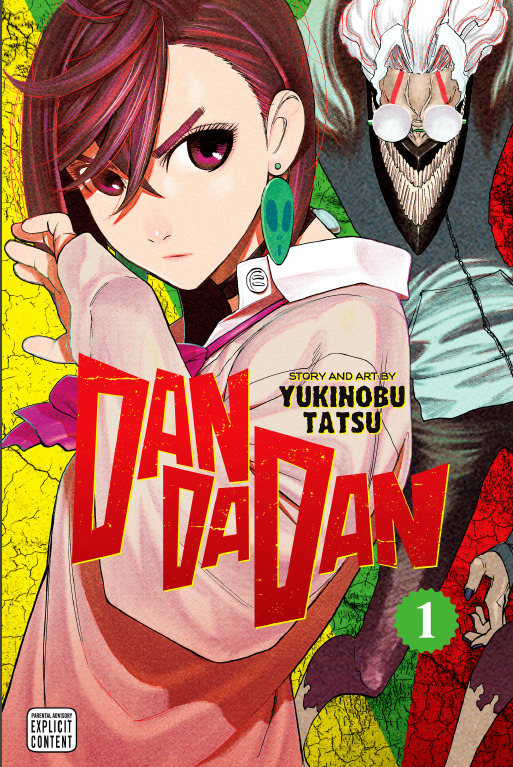
Starting these reviews off is always the hardest part, but it often comes to me after some time filling out the rest of the article. Dandadan has been stubborn in that regard, so much so I've been trying to figure out where to start with this series since it first came out.
I began reading DDD before tankōbon's were being printed, hell before it even made it to NA digitally (There were translations in Europe which got them early iirc.) Then batches starting coming out, and I still have those original single chapters from Sept. 5 '21
I became captivated, but, like its namesake, describing why I enjoy DDD is daunting in how esoteric it all is.
The general plot is straightforward on its own: Momo Ayase, the granddaughter of a spirit medium, though circumstance meets with an occult obsessed otaku, Ken Takakura, and, yes, he's named after exactly who you think, which drives the Takakura obsessed Momo nuts. She calls him Okarun, which I will also be doing for the rest of this.
Okarun's big obsession is UFOs and aliens, which he believes in, but not ghosts. You see where this is going. Hi-jinks ensue, both go to hot spots for each others interest and what do you know, Momo gets abducted by Aliens and Okarun is possessed by a geriatric genital biting speed demon.
Feel free to re-read that last part a few times.
Suffice to say, Dandadan gets fucking nuts almost as soon as the first chapter, but we're not even close to how off the rails this series gets.
I'll save you the details of how they deal with the Turbo Granny, but I will say the mythos and rules surrounding the various spirits, urban legends, cryptids and aliens is handled with a shocking amount of intricate care. If you're like me, you grew up surrounded by a plethora of Unsolved Mysteries, caught UFO Files as it was airing, maybe you even had some of those Forbidden World books laying around from the 80s before getting into stuff like Yokai. Even though I don't really engage with that sorta thing outside Weird NJ nowadays (It stops being fun when people in public office are into conspiracies-- particularly of the nazi variety like lizard men and flat earth)
The narrative and aesthetic appeal of them has stuck with me.
Anyone that's read my Kamen Rider reviews would know how much of a sucker I am for that quintessential cryptid look, which Dandadan has plenty of along with just being absurdly unhinged and hilarious.
The first two volumes do a fantastic job setting up the limitations and powers of spirits in particular, eventually resulting in part of Turbo Granny's soul being trapped in a Meneki Neko and leaving her speed abilities with Okarun. Unfortunately, Okarun only got 1/3 of his bits back.
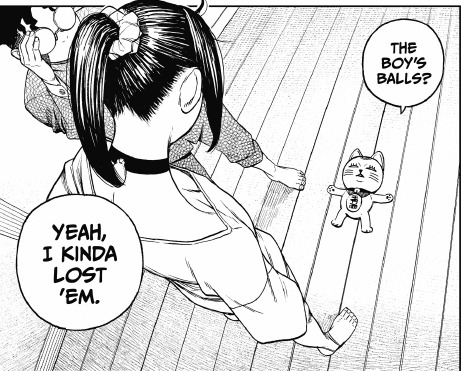
So now have two super powered protagonists touched by the supernatural and the unearthly on the search for…missing nuts. Or I guess testicles that look like magic golden orbs of power. That's seriously how we're kicking this off.
And yes, there is a basis for that in mythology called Kintama. If you're familiar with Gintama you probably knew that.
But beyond that basic set up… where the fuck do I even go from there? The series is far more than OTT action and good monster lore, but it's also hard to delve into the how and why of its overall qualities. Sure The supernatural and sci-fi bits are fantastic, and the comedy is wonderful, but it's a by product of the real core of Dandadan: the interpersonal relationships of the characters. Surprise.
Which yeah, if it wasn't clear from the get go, DDD has a romantic angle between Okarun and Momo.
Under the monsters, dick jokes, and the completely unhinged nature of everyone and everything is an oddly captivating and flat out adorable love story between our two leads, one that slowly unfolds but is challenged by the various shake ups from monsters, invaders and cast additions that occur to hinder that development; or in some cases push it further by bringing the two closer.
Okarun in particular very well might be one of my favorite interpretations of the Otaku with a heart of gold. He's a legitimately sweet person, cares for people, he trains his ass off to earn mastery over his powers to make things easier on Momo and to keep up with the ever increasing threats they face. In a sea of otaku power fantasy characters, it's nice to be reminded that characters with limitations and weaknesses to be overcome or dealt with are still showing up.
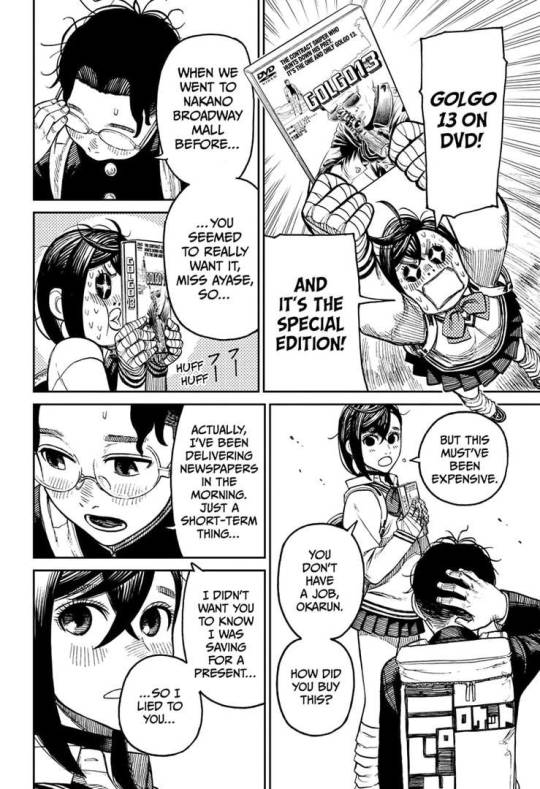
He's also just a total sweetheart to Momo.
And it's pretty clear even early on that the feeling is mutual. Momo is easily flustered whenever a cute girl gets a little too chummy with Okarun, or strings him along. She even retaliates in some cases.
Momo is also about as dorky as Okarun (As seen above) just in different ways, which makes the two complement one another while also contrasting in how much of a hot head Momo can be.
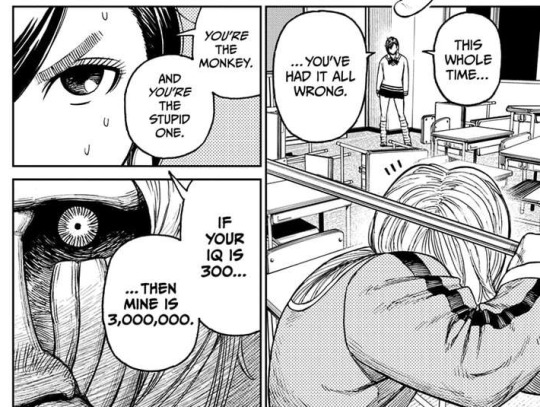
For a series that gets as bonkers as DDD, Momo's grade A shit talking "too stubborn to admit her feelings" gruff Gyaru personality helps ground the series with a rather realistic portrayal of a girl her age-- albeit one with psychic abilities and goes through some extreme struggles much later in the series.
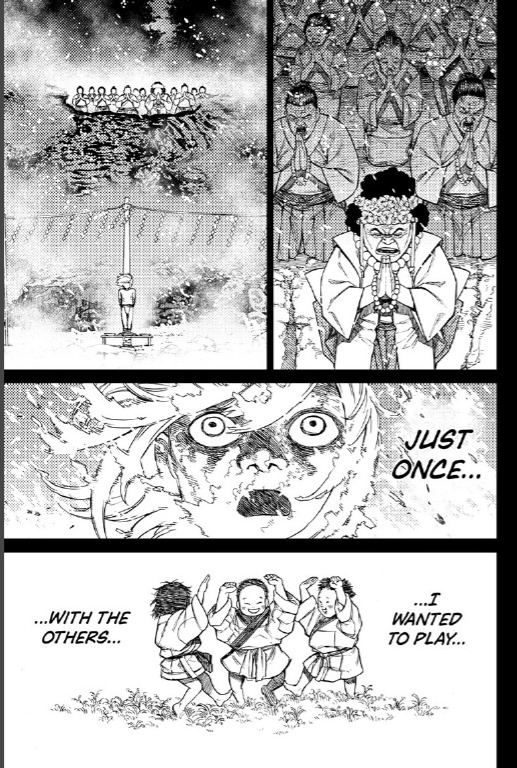
In fact one of the more overlooked aspects whenever I read about Dandadan is how surprisingly dark the chapters start to get in the 80s onward. Because despite the major kick off involving Okarun having his balls stolen, the series is capable of being very sardonic.
For all the absurd fun like giant enemy crabs or the Flatwoods monster as a Sumowrestler, and even a daikaiju way later, you also have things like human sacrifices and tragic ghost stories which are treated with a heavy tone that is never undermined by that off-kilter comedy. You even see tones of that with Turbo Granny of all things, involving the trapped spirits of butchered girls.
Don't misunderstand, however, the series is first and foremost a romcom with horror elements, but sometimes the horror shines through in surprising ways. That nuance is also seen in the rest of the cast, which I've yet to talk about much because one of the biggest challenges of this whole thing is figuring out how.
Talking about Dandadan beyond the very bare basics of the opening chapters is difficult without spoiling something, it's part why I was hesitant to review it back when I first started reading, despite how enamored I was. For one thing, focusing on any one aspect would be a gross oversimplification, doing a disservice to how each angle of the series is handled. Conversely, delving into Dandadan as whole would mean recapping the story arcs and events because Dandadan has some of the most tightly woven threads I have seen in some time. I can barely graze the surface of why character dynamics work or are unique before inevitably getting into a full blown synopsis and spoiling character arcs and entire narrative structures, which is… frustrating, to say the least.
For example, I can't really give you a good look at Aira Shiratori without getting deep into how she's a schoolmate of Momo and Okarun, gets into a rivalry with Momo because Aira thinks she's a demon while viewing herself as "The special one"; a delusion made stronger when she gains her own demonic powers which is basically Sedusa. But over time she forms a bizarre friendship with the two over their trial and tribulations, while also dealing with the massive weight of guilt over cruel rumors she spread about Momo. But that really doesn't even begin to tell you how much of an absolute fucking perfect little bitch she is, and yet what an enjoyable dork she becomes. To do so would be to just tell you everything that happens in her story, which, while not complicated, is tied heavily into the narrative.
It's a similar scenario with Jin "JiJi" Enjoji, Momo's first crush, which you can imagine the upset that causes; one that's pretty goddamn funny because the dude, while handsome, athletically fit and arguably the strongest of the entire cast, has the personality of a goddamn muppet. So Okarun's getting all strung up on a guy even more goofy than him.
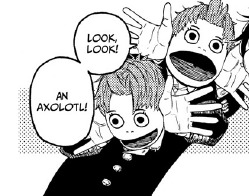
In a nice subversion, his relationship with Okarun develops into something surprisingly positive pretty quickly, if not without complications due to a fairly dark story with his character, which pushes Okarun even further in his training after Jin gets his own possession. And it also makes it all the more hilarious that the chipper muppet baby has a secondary Shadow the Hedgehog cracked to 11 persona that's a legit threat.
Then there's Kinta "Kinny" Sakata who is basically if Okarun was even more socially inept and a dipshit Gunpla addict who tried really hard to be a Jojo. His strengths is a vast knowledge of sci-fi tech and a chuuni like ability to imagine entire fantastical constructs; quite handy when mind reading alien nano machines enter the picture. It also helps break up the monotony of everyone else having or developing some sorta supernatural power.
And then we have Vamola, a character I literally cannot say a single thing about without giving away massive plot points. I can't even show a photo because her design itself contains spoilers. Just know that her story is when shit really hits the fan and will be a gut wrenching read while also having the most Battle Manga goodness.
What I can at least tell you is that for as much as Momo and Okarun are the main protagonists, Jin and Aira get damn good focus and are fully formed characters in their own right, they're not just a monkey-wrench thrown into the fray. I mean, they are also that, but they add to those elements while being more than a foil to our main heroes developing relationship, making the story much more varied and expansive than a supernatural will/won't they. Vamola especially in that area.
If there's one takeaway from this it's that Yukinobu Tatsu is capable of creating a great, varied cast full of humor and impeccable chemistry. (not to mention a lot of cheescake that shouldn't work as often as it does.) I'm constantly surprised with how masterful all the different pieces come together to create a compelling dynamic in this deranged Sci-Fi, Supernatural comedy mishmash. Hopefully I can convey a little bit of that Dada-esque appeal despite my spoiler aversion.
What's a lot easier for me to get across without spoilers, however, is the drop-dead gorgeous artwork. Good god is this series beautiful to look at.
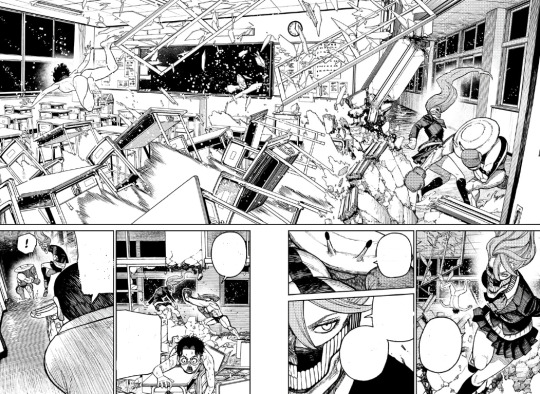
Tatsu has a backround in, uh, backgrounds, and it shows on just about every page. Any one side panel has more detail than most double-page fight spreads in other books, and when they do a splash page it is breathtaking.
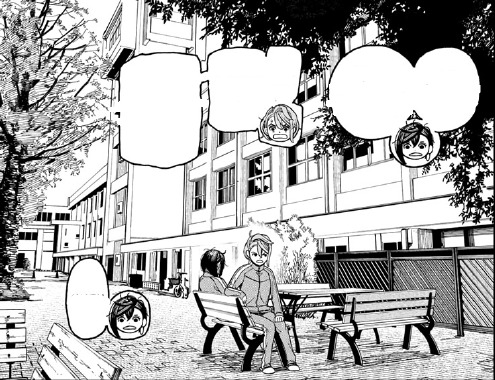
The fact this is a Weekly series is goddamn insane and… honestly kinda makes me a lowkey worried about their work ethic. But a lot of panels feature just the character on simple stark backgrounds (And some pages feel a little heavy on the reference material, if you get my meaning.) But even so, it's hardly a sacrifice for the impressive amount of work that goes into each chapter and how just about every other page has at least one impressive environment to gawk at.
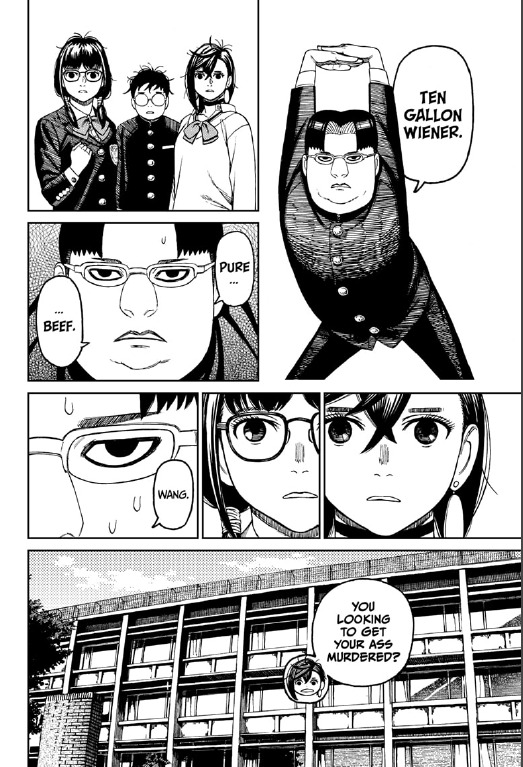
Not only is the detail impeccable, but the layout, timing and expressions are goddamn phenomenal and a big part of making the series legitimately funny. That same talent translates seamlessly to high energy fights and impactful creepy moments.
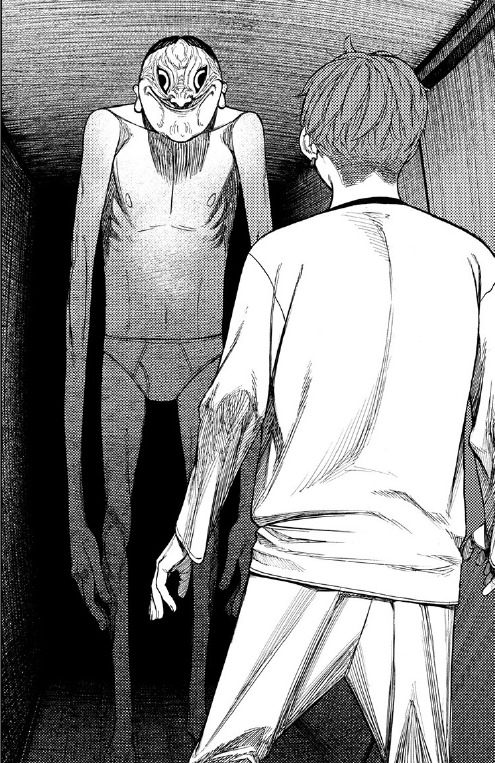
This truly is one of the most compelling reasons to read the manga. At the time of this writing we're 5 episodes in the Science Saru anime and I want to make clear I'm enjoying it and do highly suggest watching it. I think their high octane stylistic approach is, in many ways, perfect for the series. There's clearly a lot of love put into translating page to screen best they can. Realistically, I know there's no way you could completely capture Tatsu's style 1:1, especially with what the industry is nowadays. The budget and man power it would take for that wouldn't be worth it.
But that sense of scope, scale, the depth, shading and a ton of small eccentricities is something unique to the manga and a big part of why it works. If you only know the anime then I think you're missing out. Plus you've got 8 volumes to read up on.
But also still watch the anime, I'd love a season 2. Hopefully with a bigger budget. Frankly, they're gonna need it.
That said, while I have praised and gassed up Dandadan, I should mention it has a number of trappings that by all means should not fly with me. As previously stated, there's a lot of cheesecake, and I like cheesecake, but it can bog down stories like this and they're a dime a dozen in the manga and anime world. At first glance DDD can look like that from the outside. There are so many instances of things that are annoying in other works, schlocky things (derogatory) that are sell themselves only on the limp-dicked exploitive elements like Fan service. Make no mistake, Dandadan is schlocky (complimentary) but it's also incredibly endearing not only outside those aspects, but in them. At least for the most part. I have to imagine it's aware of the more stupid indulgent elements but wisely plays them straight while at the same time employing a cleverness many other series fail to have.
For example, the characters are comically stripped very frequently, even (and usually) during otherwise semi-serious moments like battles (although not if the stakes are dire.)
But the cheescake is always balanced out by the other qualities. Hell, the cheesecake is often imbued a certain charm that is funny in itself or oddly sweet, which certainly becomes more true in the later chapters. Think more Cutie Honey and less Highschool of the Dead in terms of how it's handled.
A big hand in that is they're not afraid to get silly with all the characters, especially the girls, so it typically feels more tee-hee fun. They're almost if not equally goofy in their own ways and that does a lot in keeping it from being obnoxious. And ya know, they also have real developed personalities and relationships outside just having their clothes blasted off, which also happens to Okarun if that wasn't clear. Actually it's worse because he usually loses everything, and the same is also true for Jin.
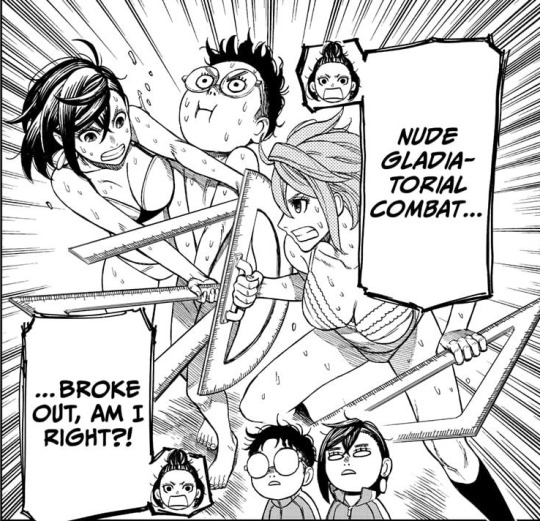
It's so audacious in every aspect that I simply can't fault it. I mean, I also wouldn't fault anyone not gelling with it, but I just sorta expect it and roll with it for a series this absurd. I'm a critic, not a goddamn puritan. I know exactly what it is, and it's doing it far better than most. It is, at worst, background noise.
That's not to say the series handles all of its exploitative elements well. Rather infamously the first chapter has an almost not quite sexual assault for Momo. It's… not as bad as it sounds-- in part because it doesn't happen and also the situation is so absurd. Honestly I think there's been a bit much blown out of proportion with it. Still, the over the top nature of an Alien with a metal syringe dick getting his comeuppance by having it bitten off by a granny speed-demon can only mitigate the general grossness of the implication so much and I still wince at it. It's the only part of Dandadan that dips into a level a cheapness it otherwise sidesteps in most other endeavors. Thankfully, it happens early on, but it also isn't a great first impression, especially if you didn't have more chapters or episodes to view at the time, leaving you to wonder just what the hell kinda story this is.
It's worth noting some of the other early chapters have bumps here and there, but nothing quite on the level of chapter 1, and those parts are ironed out overtime to be a lot more palatable. Compare how chapter 3 handles T&A to chapter 26 and you'll know what I mean.
Aside from that, however, there is at least one semi major stigma I have against Dadadan's otherwise enjoyable self indulgent nature, which is that a lot of the monster designs are painfully derivative. And I mean DERIVATIVE. Just about every alien creature in this series is an Ultra Kaiju.
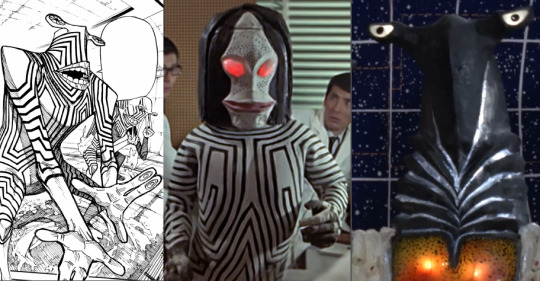
Oh Shin Godzilla in the case of Nessie.

And, look, I get homaging stuff you like. Dr. Slump has loads of references, Patlabor has references to Ultraseven, depending on which version of Urusei Yatsura you're looking at it's loaded with them, Project A-KO has them, Eva is a love letter to Jissouji Ultra (along with flat out copying a few fights from various 70s mecha anime) and even something like Bocchi The Rock is at least a quarter references. References are not the problem. Well, maybe a little, but I'm not gonna get Orson Wells on you here.
Regardless, its hard not to think that maybe they could've dialed it back a little bit.
The Z'gok in Gundam is based on Alien Zarabe but it's doesn't look like a knock-off version of it. But the Dover Demon in Dandadan looks like "original the character" Kanegon that turns into Baltan. Because it is.
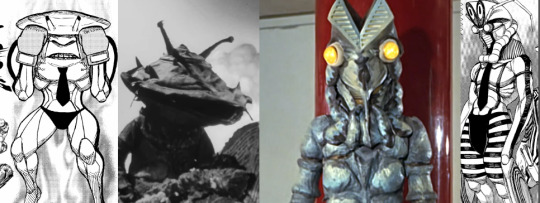
Like come on, man. Even the Space Pirates in Metroid aren't this blatant.
Why this sticks out to much is because the art is so damn impressive but the design aspect is lacking in certain areas. I'm willing to give leeway for some designs if they're based on folklore elements like Ghosts, Yokai, and crypids. You want to make them recognizable, but can still work in cute references or original ideas without being as glaring as "we have Ultra Seijin at home." For what it's worth, I guess Dada knockoffs with Pegassa eyes are better than generic greys. But while it's cute at first, I felt it got irksome by the time I saw Shin Godzilla… and then Hipporit as a subterranean shows up. Then a tail-less xenomorph. And Alien Guts, and a Metal Gear, and Elecking, even an Alien Zarabe.
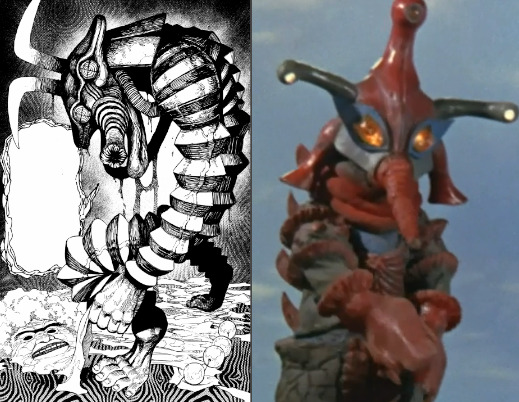

A lot of those do end up as cannon fodder so I can understand not wanting to put a lot of work into stuff that ends up being one offs. I can't deny the art looks incredible and hype as fuck. But man, it gets distracting sometimes, especially when Gomora shows up at one point with the body of Red King and later on they end up making that a major deity in an alien culture. It's not played as a joke at all. It is one of the most dead serious chapters… But it's still just an Ultra Kaiju. Sometimes I'm reading Dandadan and I'm having a great time and I'm getting all the referential designs, and I don't *hate* this, but in the back of my head all I can think of is that line in Akibaranger.
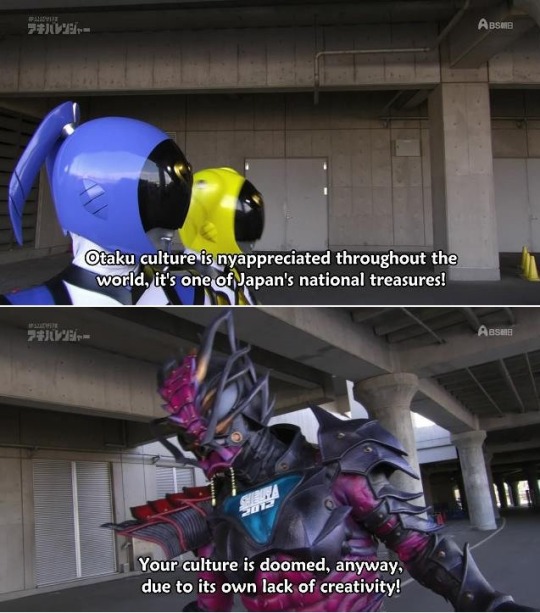
And on some level I do get how that borderline level of infringement adds to the absurdity, how the near mono focus of a singular love for Tsuburaya is charming. Hell, it's even refreshing in some ways considering how that hasn't really been a thing in Japan since the 80s. But it does still get a bit much from the sheer volume.
I think on some level Tatsu knows this because in the more recent chapters the Serpo Aliens are primarily depicted in their disguised forms and the fake Gomora gets a slight redesign in later appearances that's a lot more generic. I sort of get the impression things that were maybe meant to be one off gags ended up becoming reoccurring elements, but given the tone and humor of the series that's really hard to tell, for better or worse.

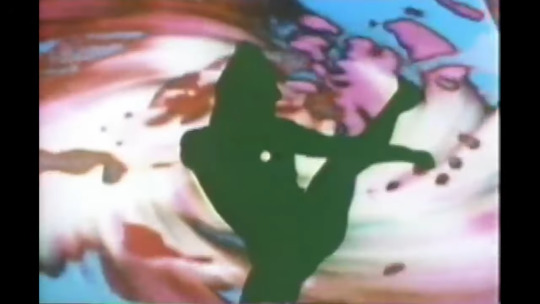
Although kudos to Science Saru saying fuck it and making the opening to the anime one big Ultraman reference. They know what they're doing.
All that said... I don't really know where to lead off from here. Dandadan is still ongoing, currently at about 170 chapters in Japan, while the anime is still currently airing the first season. So I can't really give a full review of either. Likewise, for all I know the series could go completely off the rails at some point-- in a bad way, I mean.
As it stands I'm still finding enjoyment out of this series and now seems good a time as any to suggest everyone check it out. There's multiple manga out, it's easily available digitally, there's the anime across multiple platforms in NA, we've got figuarts coming out. It's good to see.
I was long over due for look since first reading those Glitter screen-grabs some years back.
Funny enough, this late August I visited my Girlfriend in Illinois and got to see 8 volumes of Dandadan on the shelf in a comic shop, that was a nice surreal experience for something that wasn't even available digitally in NA when I first started reading it.
What I didn't realize at the time was when I took a photo of them on the shelf, it was September 5, three years to the day I got the first few chapters. So yeah, it was time for this to happen.
Given the on going status of DDD, I'll certainly be revisiting the series for a future look at and proper review. Until then, I encourage you to read the manga and see if you see what I see. It might not be some super deep narrative, but it is most certainly unique and well worth your time.
As always, thanks for reading.
21 notes
·
View notes
Note
I read this thread that I found quite interesting if you want to check it out
https://x.com/darksvster/status/1817785978708480244
Rhaenyra is in a way turning into a cult leader a la Paul Atreides, believing herself to be the prince who was promised, recruiting smallfolk who have nothing to lose and sending them to their deaths to fight in her name, its a very prevalent theme actually. The dragon keepers being appalled by the massacre this will cause but her insisting on it, its a descent into self glory and obsession. The more she gets closer to the Iron Throne the more it corrupts her which is why I’m absolutely sure they will include her getting cut as soon as she sits on it. Let’s face it, as much as I hate to admit it, misogyny isn’t a main theme in HOTD.
When I heard Ryan described this scene as cult behaviour and Rhaenyra acting as a “pastor”, my mind went straight to the Shepherd (a strong follower of the Faith of the Seven), they’d be the different sides of the same coin, Rhaenyra brought down these gods, here they slaughtered the smallfolk but at the Storming of Dragonpit, it’s the smallfolk destroying them.
And if you take into consideration that the prophecy was proven false in GOT and how HOTD is trying to hammer down the idea that monarchies and especially Targaryen ones are terrible, it leads you to the idea that anyone who thinks them selves as the savior is a false prophet. Viserys told her about the prophecy to make her pursuit of the throne more legitimate and peaceful, however it ended up making her more unhinged because she now believes herself a prophet when its all a farce, neither she nor her descendants will be the saviors IN SHOW LORE (please don’t misunderstand me, I know that in the books, the prince that was promised and Azor Ahai are Daenerys and no one else).
Didn't watch the episode, so this is pretty helpful and explains a lot why I kept seeing Rhaenys-cult leader in my Twitter timeline. How interesting...
Always remember that Condal came from a Catholic school (I also did but you don't see me trying to make a canonically family/woman who never really had much enthusiasm for religion religiously cultish...)
Rhaenyra never tried to build any sort of cult around herself or dragons
dragons always choose their own rider, so the dragonkeepers protesting Rhaenyra having lowborns have access to dragons is more classism than religiousness still wouldn't make any sense besides bc 1) they'd be going against their dragon-gods' wishes/authority 2) there's no proof of them even coming from Valyrian families... unlike in the orig lore, in the show they seem to be randos who can speak Old Valyrian and have ritualistic practices concerning dragons as literal gods/reps of gods
Old Valyrian dragonlords were never particularly religiously "devoted" or defined themselves through gods even with them having their own gods as they had a multireligious state in Old Valyria....at least comparatively to other peoples, inlcu the andals, who are actually the ones who you'd say were religiously cultish with their carving Seven symbols in their foreheads and later talking something close to Manifest destiny to explain how/why the fled Essos (when it was more liekly bc of the Valyrians)
the dragonkeepers have never in all of history been in the authority to deny a Targ anything based on any sort of separate and independent authority OR religious beliefs bc their role was just to guard dragons/their eggs/their lairs
AND
that he's mainly trying to create a story he's always wanted to see as a fan of GRRM's work (BigThink article):

So, yeah, all this matters for the exact direction you predict and I dislike this concept.
#asoiaf asks to me#ryan condal#rhaenyra targaryen#rhaenyra's characterization#hotd characterization#book vs tv comparisons#hotd writing#hotd critical#hotd comment#hotd#asoiaf#the dragonkeepers#asoiaf dragons#asoiaf religion#old valyria#the valyrians#asoiaf history
38 notes
·
View notes
Text
Finding Banned Books Online: Actual Resources
Hey, it's me - a version of Clove who is now able to access their anger through means I am not going to delve into on a public space. Hello!
I have continued to get myself very upset over the people who tear apart anyone who makes the vaguest attempt to support, or even provide mixed opinions on the IA lending library. They insist there are so many ways to do this already through resources provided by libraries, but don't actually say any of those solutions.
Because Google is free, right? It's free and definitely still a viable way to easily access information. We all agree Google is normal and reliable, and that people these days actually know how to manipulate search terms in a way that effectively provides information. That's why it's such a great thing to say when people ask questions instead of actually providing information that could easily solve the problem in your favor. Great!
Anyways, I went ahead and did research so I can offer an actual guide to people looking to access - in this case specifically banned books - without the aid of piracy or the Internet Archive. These are programs created by libraries, fully legal, though admittedly not always the easiest to access.
The Palace Project: Banned Books Club
This seems to be the best option I was able to find. It's an app created by the Digital Public Library of America where you can access a variety of digital library archives, including the Banned Books Club. You don't need address or proof of ID - you don't even need your legal name.
You get a digital barcode you can use to access books for about 20 days at a time. They have a vast collection of e-books and audiobooks, as well as a bevy of fiction and nonfiction. Cool!
Brooklyn Public Library: Books UnBanned
If you're a young person in the United States who has their apps monitored, this is another alternative. The Brooklyn Public Library waives out-of-state e-card fees for youth that last a year (You might be able to reapply).
They cover you from 13-21, assuming you can work up the nerve to apply directly by emailing them, or messaging them on their youth-led Instagram account (@bklynfuture).
The Uncensored Library
Are you outside the United States? Do you have a computer that runs Minecraft? This is not technically a way to read Ulysses or The Hate You Give, but The Uncensored Library is a massive world seed dedicated to preserving (I think mainly) journalistic articles covering news in countries where censorship is way more prominent. This is an outlier to my point but it kicks ass and I think it has a place on this list.
There are other options out there like Hoopla, but it looks like a lot of them require an existing library card number. Libby has a nice UI thing that guides you towards the options in making an online library card for a local branch, assuming that's something you are able to do.
This is what I was able to find through about 45 minutes of searching. If someone else has an additional insight I would LOVE to add it. Libraries are working so, so hard to provide as much of a reach as they can, but unfortunately it's difficult to spread awareness without Spreading Awareness, if you know what I mean.
At the same time, if you're a person who is just spouting that these resources exist without either naming what they are and/or acknowledging that there are a small small small handful of options - it definitely seems like you're less interested in sharing information to encourage a positive change, and more invested in looking right and informed.
I spent almost an hour to find two actual sources to share. If I wanted to read a book I didn't have access to, it would be infinitely easier to give up. It is so fucking easy not to make the effort to read a book that could potentially change your life. It's so fucking easy just to not read! So hopefully this helps someone expand their horizons in a meaningful way, or just have better access to a library system that they might not otherwise have!
#bookish#booklr#writeblr#book reccomendation#internet archive#clove rants#we can solve so many arguments if we just share information#but it seems people would rather argue#which is awesome have fun#but jesus christ there are better forms of activism
22 notes
·
View notes
Text
a little introduction to the ftm collective
hi! this blog is a place for transmasculine people (and those interested in transmasculine literature) to share, discuss and understand the various transmasculine experiences
i created this blog in an attempt to read, document, and share as much transmasculine and ftm literature as possible, both published and self-written; if anyone has any recommendations for books/essays/poetry/etc, or would like to share their own ideas or experiences, my ask box and submissions are always open
additionally im always interested in reading or participating in any journals, zines, essay collections, projects, etc, so please let me know if any are going
an extra little disclaimer, hate towards any group wont be posted to this blog, though all questions will be answered assuming theyre asked in good faith
a little bit more about me (the blogger), and a little about my tag system below
hi! im a trans man with an interest in ftm and transmasculine literature, im stealth/low disclosure in my personal life, so this is a place to discuss trans experiences openly! im a philosophy student and have a vested interest in what it means to be trans from a more abstract philosophical perspective, as well as historically, socially, and personally, so i hope to cover a range of experiences and perspectives through this blog.
whilst this blog will focus on transmasculinity, i am also interested in and may post about:
transfeminine, transneutral, multigender and xenogender literature and theory
sexuality, and in particular how being trans and sexuality can overlap
disability theory and activism
tags:
library - any full books or essays i post or reblog
recommended reading - anything books or essays i personally enjoyed and can recommend
ftmcollective - any essays posted or written by me
any quotes or segments from books, journals or articles are tagged with the name of the text and the writer
theory - any theory i reblog that isnt a book or essay
chatter - just me saying things
20 notes
·
View notes